#This is what learning english from da internet does to you
Explore tagged Tumblr posts
Text
I fucking hate tiktok. I genuinely thought "unalive" was a real word ALL THIS TIME because english isn`t my first language. What the hell
#This is what learning english from da internet does to you#shitposting#i cant#engrish#internet#why#why am i like this
8 notes
·
View notes
Text
Kagerou Daze: Ch. 62 - Saeru’s “Hunting Ground” 🖤💛🐍

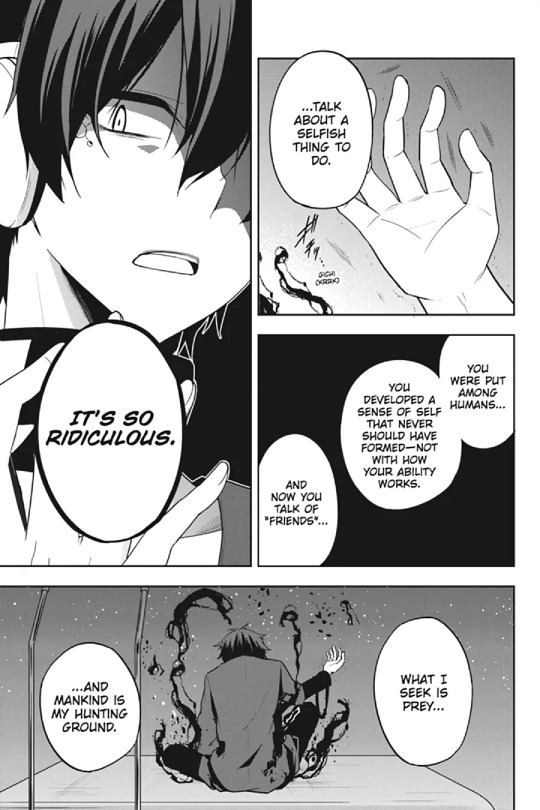
Literal Translation
Kuroha: “Wishes are fodder (for me), and humans are my seedbed.” (*)
Notes:
Alt 1: “Wishes are bait, and mankind is my seedbed.”
Alt 2: “What I wish for is prey, and mankind is my seedbeed.”
Official Translation by Yen Press
Kuroha: What I seek is prey…
…And mankind is my hunting ground. (*)
---
クロハ:願いは「餌」だ
クロハ:人間どもは「苗床」だ
---
(Kuroha: Negai wa “esa” da.)
(Kuroha: Ningen domo wa “naedoko” da.)
---
Notes:
Dialogue from Kagerou Daze Manga: Ch. 62 - NO TITLE
餌 (Esa, “Animal feed; fodder; pet food; bait; lure; enticement”)
苗床 (Naedoko, “Seedbed; seed plot; nursery”)
Notion Version
Copied my rambles over from my Notion Docs for those that prefer the picture version with line breaks and highlights.
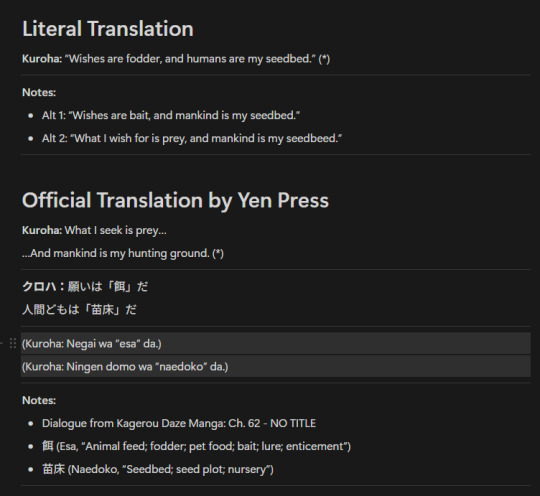
Rambles
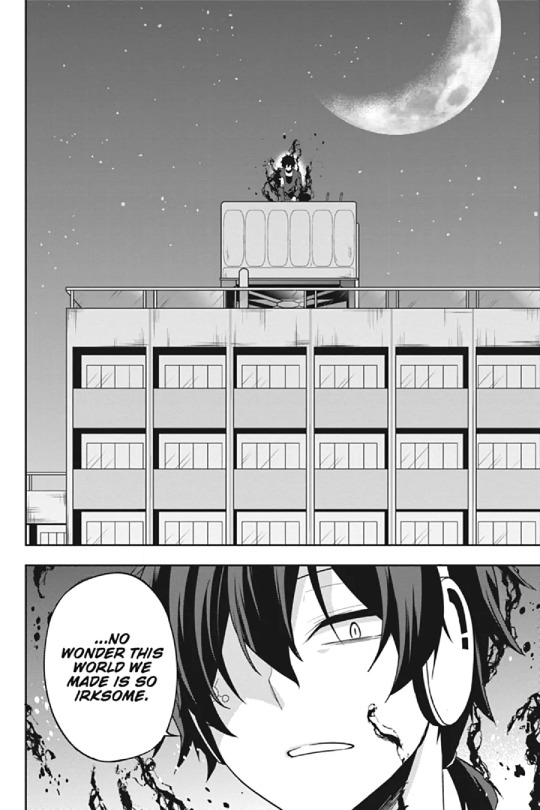
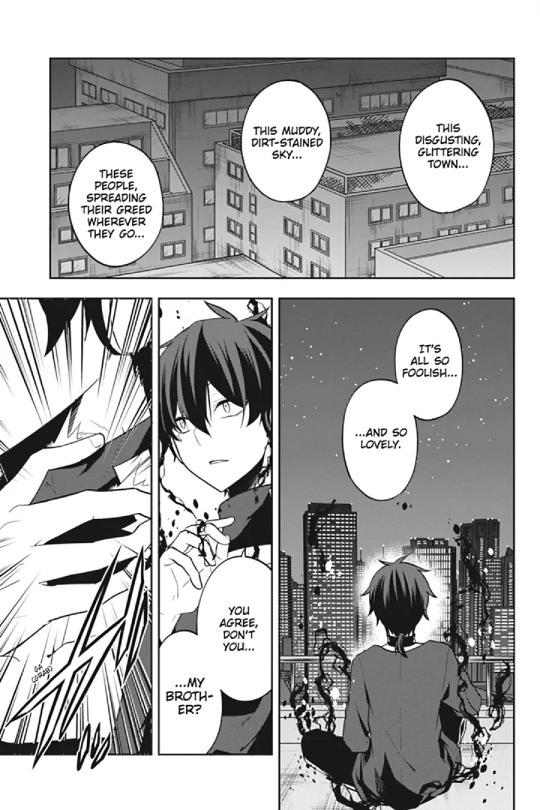
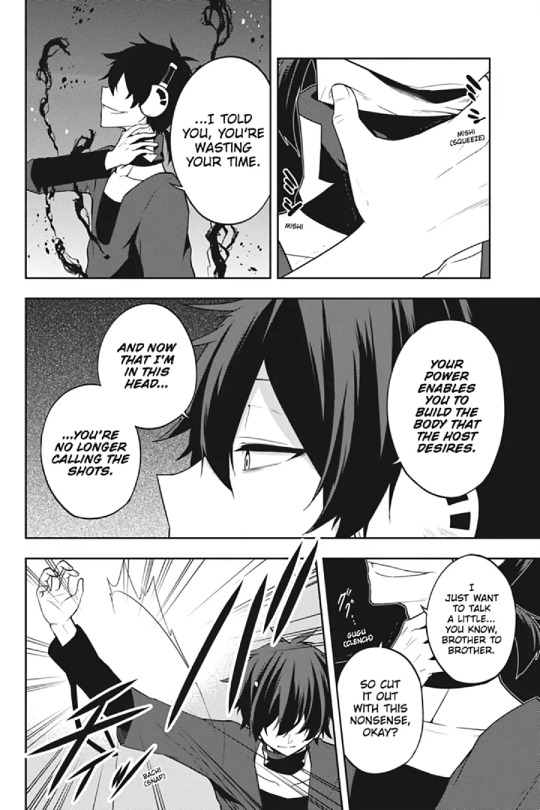

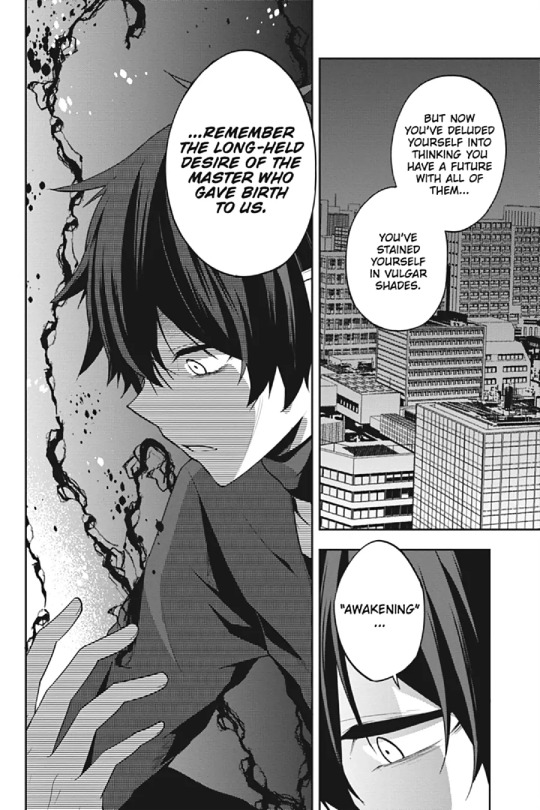
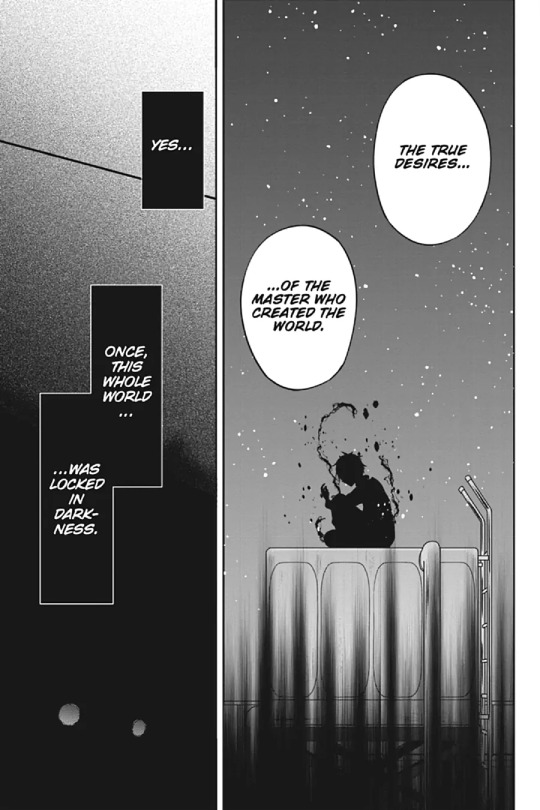
Kagerou Daze: Ch. 62 - NO TITLE - Saeru speaks with Konoha
“What I wish for is prey, and mankind is my seedbed.” (Literal Translation)
“What I seek is prey… And mankind is my hunting ground.” (Official English Translation by Yen Press)
Wanted to ramble a bit.
I think the JP wording is so interesting.
The original line has such interesting wording…
I LOVE Yen Press’ prose and how they translated this line.
I posted my literal TL above.
Oh, the JP wording is interesting... I also learned a new word with this.
Yen Press translated his dialogue SO well. This line is SOOO good. I love it so much!!! 🖤 💛 🐍
“Wishes are bait/fodder” → More literal TL of the JP text.
“What I wish for is prey” → More liberal TL by Yen Press.
I definitely understand how Yen Press got that, with Saeru basically saying, “What I wish for is bait/fodder” -> "What I seek is prey..."
Especially since “bait” is used to lure in and entice prey.
The way Yen Press translated his dialogue here is so good. It perfectly plays up to Saeru Hebi being the predator animal (“hunter”) and the Mekakushi Dan (“Eyes”) being his prey (targets)
He’s the instigator of the time loop tragedy, and the “orchestrator” and “winner” of this game.
Reminds me of a puppet master who controls the strings.
The evil, cruel, powerful snake, and these weak little humans!!! (At least in his eyes)
Notes
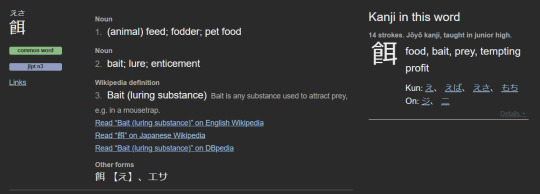

Word:
餌 (Esa, "Bait”)
餌 (Esa) refers to food you give to an animal. It could refer to bait to lure prey (ex. when fishing), or animal feed (ex. when feeding your pets)
Word:
苗床 (naedoko, "seedbed; nursery; seed-plot")
Consists of:
苗 (nae, "seedling; sapling; young plant")
床 (toko, "bed; bedding; floor")
Misc Rambles

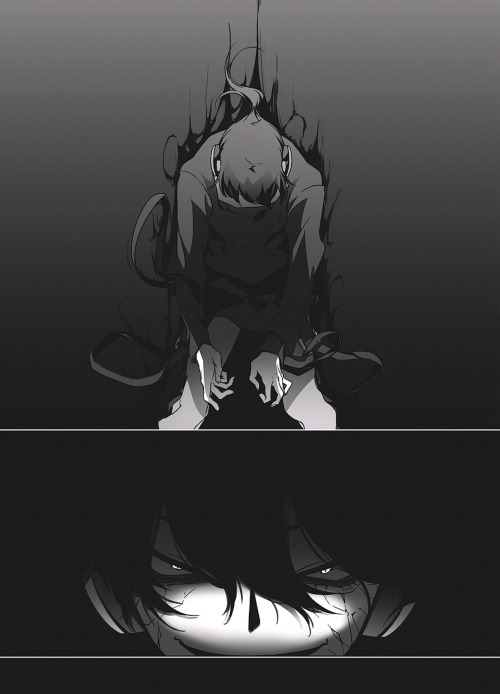
I think what's also interesting is that the JP version uses the same wording (repetition) of “Desire” (*) to emphasize the “Desire” that underlies Saeru's origins and motives (to fulfill his Master’s desire, since Azami’s original desire is what’s sustaining him)
Note: 願い (negai, “desire; wish; hope”)
As a language, English is harsh on repetition unlike Japanese, and needs to avoid sounding too stiff.
Though I do think Yen Press keeps it pretty intact with the use of “Desire”
With the original JP version, his wording does evoke the imagery of a “human seedbed” 🌱
It also reminds me that Saeru has referred to the Mekakushi Dan as “pitiful little sheeps” (哀れな子羊たち, aware na kohitsuji-tachi) 🐏🐑
For me, it evokes the imagery of the poor little sheeps falling prey to the big bad snake... 🐍
A seedbed is a bed where seeds are grown (where seedlings are planted) 🌱
The place (world made by Azami) where “seeds” (humans) are “planted” (birthed)
Huh...
I bet he���d have such a fascinating viewpoint of the world.
After all, Saeru Hebi is the embodiment of Azami’s knowledge/wisdom. 🤭
Also my internet has been SO ass lately, like it keeps randomly disconnecting 😭
Shitpost Rambles
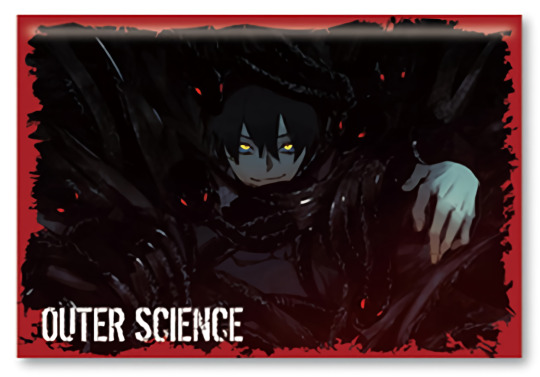


I originally wrote these as tags but tbh I think I should add these rambles to the post itself.
Also with how Saeru calls Konoha 兄弟 (kyoudai, “brother; sibling; mate; friend”) and 同胞 (douhou, “brethren; brothers”)
Since they come from the same creator (Azami)
It's so funny to think of this whole situation as Clearing and Awakening's Beef. Family feud /lh
Comedy Show Start-Up: The Snake Siblings are fighting!!! 💥💥💥
Saeru is like the eldest sibling no one likes /lh
It's so funny (angsty) when you bring the 9/6 multiships into this with Ene and KuroEne and KonoEne.
Mr. Steal Yo Girl and Mr. Steal Yo Life (Body) 🖤💛💙🐍🐇
Feila was like “The brother that wants everything that you have and ended up taking it all for himself…”
Ene look away from this mess /lh
Guy who stole your late love/lover's body.
This situation must be so surreal 😭
Don't take this seriously, this is more shitposty
Yen Press Rambles
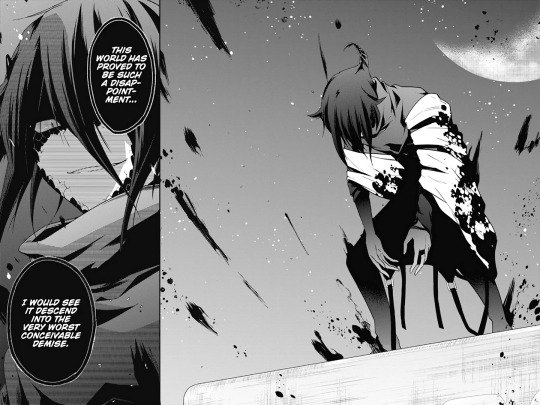
I also noticed that EN localizers tend to lighten the scan colours a bit (dark gray vs. pure black) in their scans.
I wonder if it's intentional irt printing EN volumes (or if it's cheaper to print them that way?)
I far prefer Yen Press over the other major English manga localizers (Viz, Kodansha)
I LOVE Yen Press' prose and translation style.
Yen Press’ TLs are always more liberal compared to fan-TLs. Their translators typically have such a good understanding of context.
There are some minor errors with the Eye Ability names being translated inconsistently, but I’ll forgive it since it’s honestly inevitable in a 200 page volume.
Thank god that they were the ones who translated the Kagerou Daze manga.
Yen Press's official EN TLs have always been good for the most part (aside from the minor TL errors for the Eye Abilities and etc., but I can't really blame them since it's inevitable in a 200 page volume)
100000000% prefer them over Kodansha and especially Viz LMFAO
Yen Press as an EN manga localizer has really good prose.
Yen Press rules.
I trust that Viz has skilled translators, but Viz tends to make weird translation choices sometimes. Maybe this issue is on Viz's publishers or editors?
At the very least, Magi's official EN TL is decent. Thank god.
Though, I wish Yen Press translated Magi tbh.
It’s usually Viz that tends to get the rights to shounen series (and some shoujos)
I just vastly prefer Yen Press' approach to translation and their TL quality.
I really like Yen Press’ translations.
Though I’d say that the ONE thing that Viz and Kodansha TLs have going for them over Yen Press is that they release scans in super HD (or at least make it more easy for manga raw providers to rip them), so their scans are much more higher quality and more convenient to use as art refs.
Viz and Kodansha's official mangas tend to be sized at about the 1500 x 2500 px range.
It depends on the series.
Yen Press releases their E-books at a smaller resolution size.
Kagerou Daze's official English version scans by Yen Press are about 900 x 1350 px.
I know Yen Press translated the KagePro manga volumes and LNs.
And frankly, thank god.
YP has minor TL errors with inconsistently translating the names of the Eye Abilities at times, but that’s more minor tbh. I really like their translation style in general.
And how Yen Press tends to include info pages explaining honorifics and key terms.
Idrc for Yen Press’ lack of redrawn SFX tbh, so I'm completely fine with Kodansha and Yen Press just putting the translation for what the SFX means in EN text, either next to, or under the original JP SFX.
I did confirm that the Kagerou Daze Manga’s Official English Translation by Yen Press has scans that are 900 x 1350 px.
They are not as HD as the ones I ripped directly from the JP raws. The Kagerou Daze manga's JP scans are 1441 x 2048 px.
But it'll do for now.
Yen Press also tends to release official EN TLs really quickly for the series they work on. Yen Press is honestly a blessing
Yen Press is one of the only major EN localizers (at least that I know of) where their TLs are either the same quality as, or even better than fan translations, and much more accurate too.
Yen Press' TL and wording/prose are REALLY GOOD. I also love their translator notes.
It helped me figure out things since they added to the context of some lines.
Their translators are REALLY skilled and have such a good understanding of context.
Their translators make more liberal TLs, but are still in line with the OG text for the most part.
Their TL helped me understand the context much better than fan-TLs too, since they add to the context of some lines with their own interpretations
#kagepro#kagerou project#kagerou daze#kuroha#saeru#black konoha#dark konoha#saeru hebi#me ga saeru hebi#snake of clearing eyes#clearing snake#kuroene#kuroha x ene#saeene#saeru x ene#Also with how Saeru calls Konoha 兄弟 (kyoudai - “brother; sibling; mate; friend”) and 同胞 (douhou - “brethren; brothers”)#Since they come from the same creator (Azami)#It's so funny to think of this whole situation as Clearing and Awakening's Beef. Family feud /lh#Comedy Show Start-Up: The Snake Siblings are having a fight!!!#Saeru is like the eldest sibling no one likes /lh#It's so funny when you bring the 9/6 multiships into this with Ene. Mr. Steal Yo Girl and Mr. Steal Yo Life (Body) 🖤💙🐍🐇#Feila was like “The brother that wants everything that you have and ended up taking it all for himself...”#Ene look away from this mess /lh#Don't take these tags seriously these are more shitposty 😭
8 notes
·
View notes
Text
The Age of Quinn in 2017
I have already shown what may be false in the document,Now let's talk about quinn's age in 2017.
I have seen people say quinn IS a p3d0p1l3 as if they mean he still is,knowing that happened 8 years ago and don't know if it is still the same or not currently.I would like to clarify about quinn's age in the alleged rolplay.
First shey claims that in the rolplay that Quinn did was 17-18 years old which was said by a friends,being older compared to her 14 year old friend:
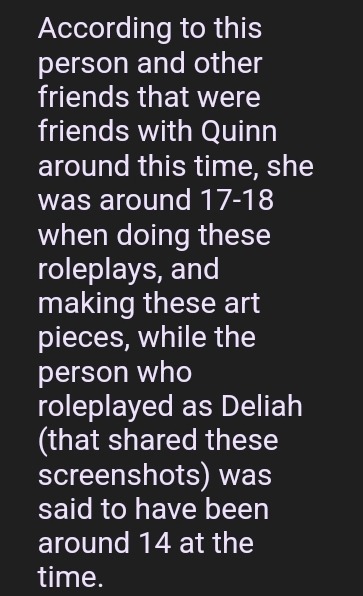
but later shey confirmed that Quinn was 16-17 years old by proving it in a discord chat.
(The English version does not show 16 -17 years old,only 16 years old.)
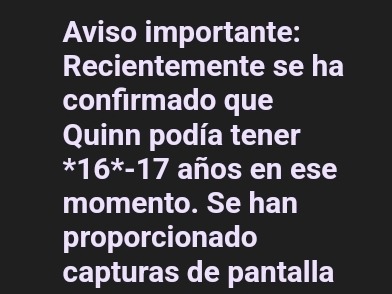
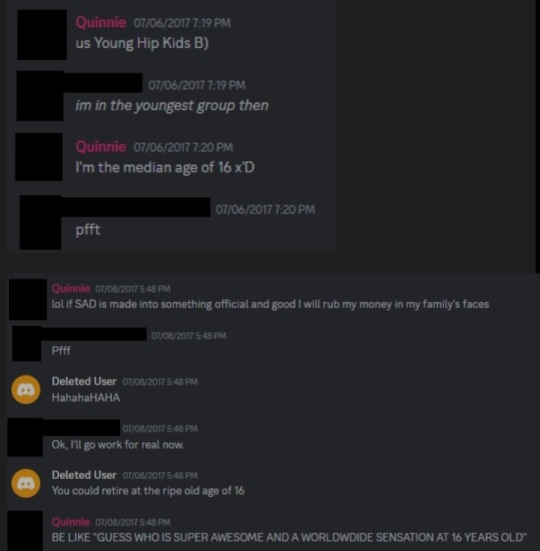
But I say that at that time Quinn was 15-16 years old,because apparently her birthday is on July 2nd,confirmed thanks to the publication of the artist Mattartist25 congratulating aberrantpaint for her birthday in DA
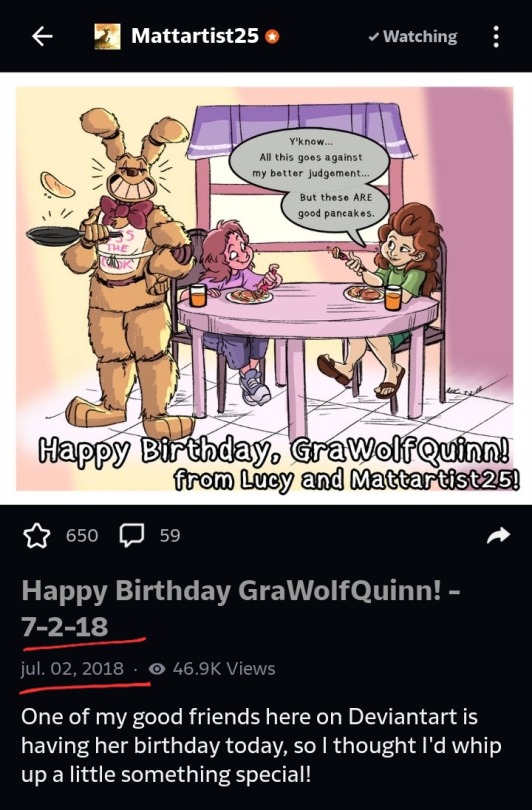
if you look closely at the messages,they are days/weeks after quinn turned 16 years old.
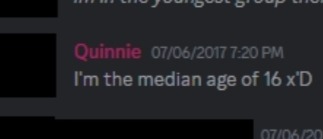

In my OPINION,there was not much of an age difference with the friend who played Deliah.It is important to recognize that they were both underage at the time of the alleged +18 rolplay,it is possible that they did not have the emotional maturity to make informed decisions about their participation in such activity.
It is also important to remember that people can grow and change over time, and that it is possible that Grawolfquinn has learned from his mistakes and has since matured,I would like Quinn to make a letter of apology or confirm what is real and not,but I fear that will not happen since he disappeared from the internet since 2021.
#springtrap and deliah#ask goldie anything#grawolfquinn#fnaf#five night at freddy's#springtrap#deliah
11 notes
·
View notes
Text
I’ve got a real nerdy question, Internet.
So because I am a giant nerd and got really bored a few years ago, I learned how to read the Star Wars language of Aurebesh. For those who don’t know, each character corresponds to a letter in the Latin alphabet and the writing translates directly back into English, so it’s actually not as hard to learn as you might think.
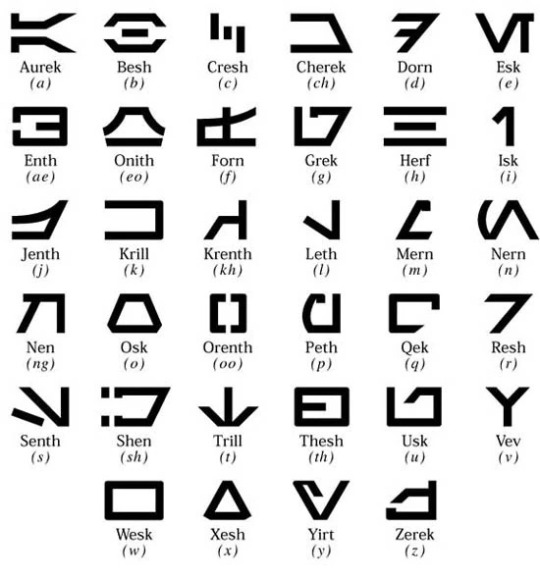
(Admittedly I don’t know the special characters that well, like “ch” “ae” “eo” etc, but they so rarely seem to be used in Star Wars anyway, so let’s just put those aside.)
Of course, though, I certainly can’t read Aurebesh as easily or as quickly as I can read English. For me, at least, I usually have to start off one letter at a time and fill in the rest using context clues. Using the sentence below, for example, I start with the first word- I see the letters M-A-Y. Okay, so the first word is “may.” Then the second word, I see T-H, and now I’ve figured out this word is probably “the” and so I double check to see if the last letter is E, which it is. Then the third word, the first letter is F, and by now I’ve figured out the sentence is probably “May the Force be with you” and I skim over the rest of it to make sure that matches up, which it does. Ta-da!

So here’s my nerdy question: this whole process of identifying individual letters and filling in blanks with context clues, is that kind of what it feels like to be dyslexic? 🤔
Because of course I can learn the symbols and as I practice reading them I do get better at it, but my brain certainly doesn’t process it the same way it does with English, and probably never will. I’m not dyslexic, nor am I close to anyone who is (as far as I know), but I am neurodivergent- which is an umbrella term used for things like autism, adhd, dyspraxia, and yes, dyslexia, among others. So I’m always eager to learn about my neurodivergent brethren, and while I’m sure dyslexia manifests differently from person to person, if this is a good analogy for what it feels like, then I dare say this would be a great way to educate people about it! 😊
(Then again, maybe it’s not! I might be making assumptions that are incorrect, and I apologize if I have. But that is why I’m asking! I really have no idea what I’m talking about, so please educate me internet!) 🙏
#aurebesh#star wars#dyslexia#dyslexic#neurodivergent#neurodiversity#apparently it’s dyslexia awareness month#I didn’t even realize lol
20 notes
·
View notes
Text
DA4 Lead Producer Scylla Costa’s BIG Festival talk, “Challenges of Dragon Age production during the pandemic”, can currently be rewatched on YouTube here starting roughly at timestamp 8:57:02 after a lil presenter blurb/intro. It’s 1 hour long. When it was streamed live, there was an English translation ‘voiceover’. There isn’t in this vid, however I want to post the link for Portuguese speakers, and also it’s neat for everyone to be able to see all the slides he presented with for themselves in context.
I don’t know if an English-language version will get put up so I’m sharing the notes I took during the talk below, in case anyone’s interested and because I might as well since I wrote them. The rest of this post is under a cut due to length.
Edit: Found a place to re-watch the English version of the talk
(Quick note: I didn’t note down everything, mostly things that caught my interest, so this isn’t exhaustive, and when I was watching I was real tired, so pls bear that in mind and don’t take these notes as bullet-proof 100% accurate gospel or direct quotes. If you watched it and think I’ve written down something wrong/misunderstood, let me know and I’ll fix. Also if you’re a Portuguese speaker and I’ve gotten something incorrect or missed something important etc, again just let me know.) **
** Edit: I’ve now gone through my notes while watching the talk again. I’ve filled in some of the gaps (although they still don’t cover everything said) and so forth, and now I’m no longer worried about there being possible errors in this post.
-----
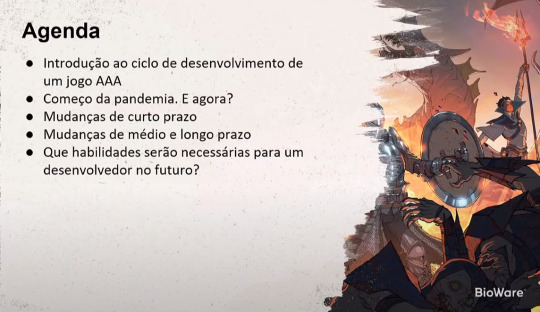
For some context, this slide contained the breakdown of the talk’s structure. Bear in mind there are other slides present in the talk than the ones I’ve posted here, I didn’t include caps of all of them, just ones which were of note to me.
In the talk, chief Producer Scylla goes over challenges of DA4 production during the pandemic. He discusses the adaptations - necessary skills and learning from remote work - and he ponders on the future of teamwork.
After the launch of ME3 he became a producer, all his MMO and other experience helped a lot. He was on DAI for 3 years and MEA for 9 months, then Anthem. Today, on DA4, Scylla and another Lead Producer were the heads of the whole project, and there is his boss is the Executive Producer Christian Dailey.
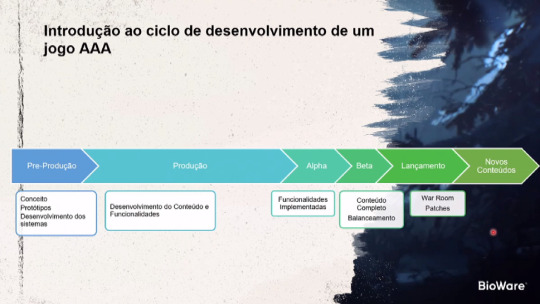
^ the usual AAA game development cycle (brief introduction)
AAA games are games that are launched for several platforms simultaneously.
In BioWare’s case, the pre-production phase of the game development cycle can have from 5 - 30 people, and up to almost 60 people when they’re just about to go through the gate to production.
In the pre-production phase, they go through the game’s concepts and prototypes and start developing systems. They seek the game’s concept and focus, and its key features. They do lots of market research. In the case of BioWare, all their games are strong in narrative, so they have lots of tools related to game narratives and supporting the development of a narrative (cinematic design, dialogue system etc) that get focused on in this phase. Other parts of the team such as writers and cinematic design need these systems to do their own roles.
In BioWare’s case, the pre-production phase through to launch can take 4 - 6 years, but it does depend on the size of the team during development.
With regards to Dragon Age 4, they were coming close to the time when they would shift from pre-production to the production stage when the pandemic hit.
During the production phase is when the development of content and features takes place, with the systems mostly already existing from the pre-production phase. A few new systems may be developed in this phase. In the production phase is when things start escalating, and the team really starts growing, to like 2- or 3-fold the prior pre-production phase size.
(DA4 is currently in the production phase.)
In the alpha phase, features have to be fully implemented and systems all have to be running / working. All the game features should already be in the game by now. They test from pre-production onwards, but this phase is when they run heavy technical tests with lots of players trying to play at the same time. In the beta phase, the idea is that you should now have full content and that now you’re balancing it and running more and lots of different tests with players before launch. There are final tweaks and then the final launch, when in the weeks prior to launch, all the different business units and areas e.g. marketing team, technology team, publishing team, get together once a day and all of the game’s issues are reported and brought to the table to be prioritized. Then they decide the next steps re: these issues (this is known as ‘the war room’).
After the launch there are usually patches like day zero patches and other patches, this being standard industry practise. The last stage is the new content stage where there are DLCs and a game with more content.
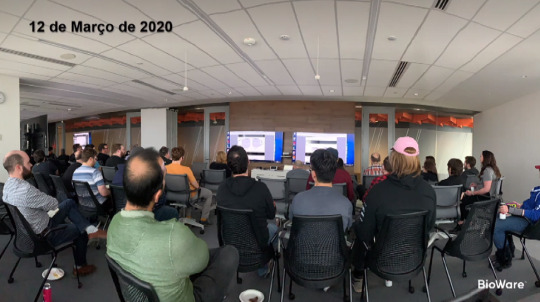
On March 12th 2020, the team gathered to review the DA4 story in the new office. Everyone was very excited. (They had spent over 10 years in their last building and had noticed that with the team growing they needed more space. In August 2019 they found the new studio in the city center.)
Anyway that evening, they got an email from the CEO which contained instructions and said that due to the pandemic, they should from now all start working remotely. They had known that this happening was a possibility so they had been planning on how to have all the devs working from home, but initially less than 50% of the devs were able to work from home successfully/efficiently due to various issues e.g. you need a VPN to be able to log in remotely to do your job normally, varying home office setups. The day after this, the office was basically deserted, except for Scylla, the IT infrastructure people and one or two odd devs.
Scylla was part of the team that was working on allowing the devs to work from home. They first started looking at the short-term changes they needed to make to allow this.
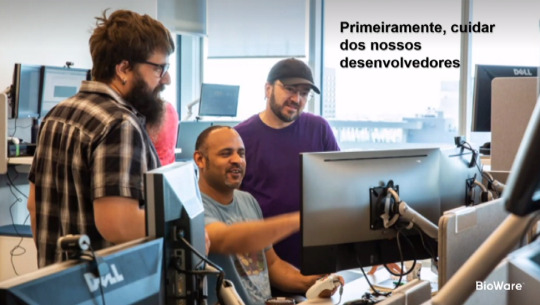
“First, take care of our developers”.
When the pandemic first hit, their and Scylla’s [as Lead Producer] first priority was to look after the devs. Many of them are parents (schools and day-cares were shut, children were studying from home), others have relatives living with them, others have other personal circumstances which of course need to be taken into account when it comes to assessing what needs to be taken into consideration for this new scenario. So, they looked at each dev on a case-by-case basis in order to evaluate, speaking to each one and asking them what they could do to support them.
One of the first changes/adaptations they could implement was flexible working hours and flexibility around deadlines. Generally speaking the devs got a lot of support, EA was really good and really supported the devs especially in the first months of the pandemic (and they are still supporting them). Initially not all devs had suitable office spaces at home, some were working from the living room from laptops or at the kitchen table. The whole covid situation basically just happened over night and nobody was really ready to deal with that change. So their first step was to enable their devs to work remotely. As a producer, Scylla’s main task is to communicate with the team such as via a number of daily meetings. He doesn’t depend so much on powerful hardware.
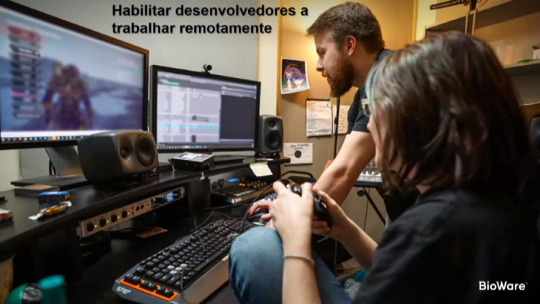
“Enable developers to work remotely”.
This slide shows some of a BioWare audio team. Different teams have varying and specific needs in order to do their jobs and therefore in order to do them remotely. For example, the audio team need good-quality speakers and amplifiers, while the lighting and art teams need other specific equipment such as tablets and large screens. So there was a lot of work they had to do to go through each dev to understand their individual needs and what needed to be done for them. ‘Could they download the builds? Did they have the right performance [tech-wise]? Could they submit their changelists, their codes to the server?’
Some devs needed a more powerful internet connection as it would take 6-8 hours to download a build (some devs live rurally). Some needed a lot of cable, as they were working far away from their routers (sometimes up to 50m). As time went by things got better and better.
The chair devs work from is also important; a kitchen able chair etc is not suitable to sit in for long-term desk work, possibly leading to health issues like back ache and blood circulation problems in the legs.
Every 3 months they had money given to help devs buy new mice, keyboards, monitors - anything they needed really in order for their office setting at home to be improved. For a while, because lots of people [generally, in society] were needing and buying them, it was quite hard to buy things like webcams and microphones.
On mid- and long-term changes:
In terms of DA, we have to look at this from 2 perspectives, the change in the personal and the professional environments.
As a consequence of working from home, people tend to be less active during the day (even in an office, you go between meeting rooms, up and down stairs etc). Physical activity supports life quality and therefore work quality. Scylla noticed that he began to feel listless and such, and found that he needed to change his routine that he had initially developed when he started working from home, for example; having a normal start time (as in, have a semblance of structure in your day as if you were still working in the office site), get dressed at the normal time, not having meetings over lunch etc. This wasn’t just him, lots of other devs encountered this and had this experience too. Devs which adapted faster had better productivity and became more productive faster.
Scylla bought a stand-up desk which he can raise up and down, and at meetings he would be delivering a talk while standing or even while walking on a treadmill. Other devs also got stand-up desks. He tracked his body’s data on a Fitbit. These sorts of things helped improve physical and mental wellbeing. Other devs did similar things, like starting going out for jogs or began practising yoga. Essentially, everyone needed to make changes to their daily routine in comparison to what they had been doing prior to the pandemic.
The pandemic has been a thing for over a year now. In their location, every couple of weeks a new restriction is put into place or a rule is changed, and every two weeks there’s a new thing that you can and can’t do. Scylla also started moving around his property. He worked on his desk, fixed it up and painted - taking up a new hobby. Other devs picked up new hobbies too. These are good ways to be active and also to be somewhere else, i.e. to break up the working day and not be spending it all in one home office-type location. Scylla found that when he made these sorts of changes to his routine to improve his lifestyle, the data output by his Fitbit as indicators of his health/wellbeing etc improved, e.g. number of steps taken in a day, heartbeats per minute while at rest. As stated many of the other devs went through a similar process.
On the professional side of things:
They had to improve remote delivery of builds. Accessing things from home as a dev requires a VPN. They need to download a build every day and then upload it to the server after making their changes to the game. They had to work with infrastructure and research other tech, such as streaming tech to allow remote console access, in order to better facilitate this process. For remote access, they also had to work on adapting communications channels.
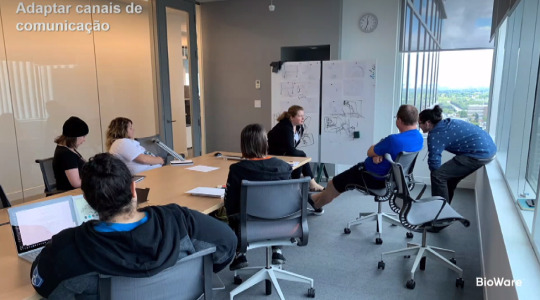
“Adapting channels of communication.”
In this slide, the team are working on the storyboards. Before you can implement motion capture & performance capture, you have to ‘run the storyboards’ like this. These are small illustrating drawings which reflect the drafts and are meant to quickly reflect the intention of the scenes that are to be built. Before the pandemic, the team would go to meeting rooms like this, sit down, talk and interact in person. After the pandemic, the question became ‘How do you do this over Zoom?’ You can, but it’s not quite the same; it’s harder to see peoples’ expressions, some people are embarrassed speaking over Zoom etc. Therefore they had to adapt their communications systems, and unlearn the ways in which they developed before in order to relearn and learn new ways of communicating.
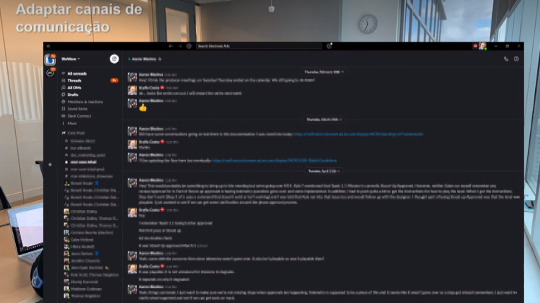
Slack was a tool that they adopted on this front. Communications channels can be confusing on Slack, so there was a need to develop structure. For example, how quickly should someone reply (as a recommended convention for the purposes of work)? They had to define the process/procedures for the channels so it was clear for the team as a whole how it would all flow (this is important especially if you have a team with say 30 people or as a whole hundreds of people). Before the pandemic, they had stand-up meetings where they’d go around in a circle every morning and talk about their activities - what they’re going to be working on, any roadblocks they had encountered etc. The question arose ‘How do you replace these?’ They ended up doing Slack messages at a certain time of day and updating their statuses with some details on what they’re working on and color-coding (green - fine, yellow - need help, red - busy/blocked out).
Another issue that they faced was unforeseen - the number of meetings that devs were having really shot through the roof. When there wasn’t a good structure of communications channels, any conversation would become a meeting. Everybody began scheduling meetings left and right, and at the end of the day they would have little time left in which to actually work on their to-do lists. Hence, they had to work with the team to really analyze and be very pragmatic. ‘Which meetings needed to happen? Which didn’t? Is a specific meeting really necessary? Which meetings should be recurring? What can be done over Slack?’ This guideline had to be given to the team to help, and it improved things a lot. The number of meetings decreased a lot and they got more effective. For example, by making sure to set an agenda for meetings beforehand, and by having meeting notes (then a dev who didn’t really need to be at a meeting could skip attending and just quickly review the notes output after instead). They also decreased the standard length of meeting times from the default Outlook blocks of 1 hour and 30 mins to 55 mins and 25 mins respectively. This 5 minute change gave devs time for things like bio breaks (also 4 hours in a row at a computer in a home office with one meeting after another just isn’t good for a person).
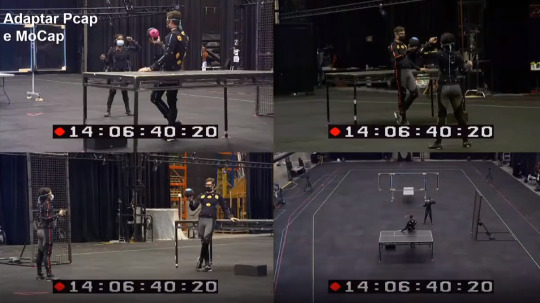
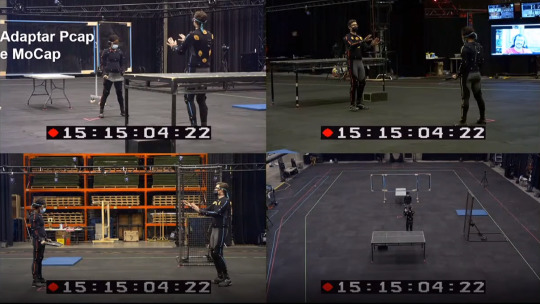
“Adapting p-cap and mocap”.
On content:
From a content point of view, the most difficult thing in terms of the pandemic was adapting p-cap and mocap (performance capture and motion capture). They hire actors and it’s a large studio. The pandemic meant big limits to what they could and couldn’t do. The actors had to be masked and 5 meters apart in distance (although it doesn’t look like it in some of these shots due to angles). Also there could be no other person around in the studio - only the actors. The directors instead would ‘patch’ in remotely on big screens (you can see this in the second photo in the top right).
Before the pandemic, they felt that they wouldn’t be able to do p-cap or mocap properly remotely, as the directors would usually stand right next to actors giving guidance on their performance. The techs would also usually be near. But they adapted! The keyword is adapting, changing process. It’s harder and it’s different, but it is possible, and people start rethinking what is possible. What was said to be impossible before now is possible.
P-cap differs to mocap in that it also captures voice and facial expressions.
On the future of work after covid:
There will probably be more working from home and more flexibility for workers e.g. being able to work say 3 out of 5 days from home. It does depend on what a dev’s specific job is however. For example, the audio engineers require lots of specialist equipment and said equipment is of higher quality and quantity in the office. So, depending on role, devs might be working more often or less often from home.
Another development is that lots of devs are moving house. In lockdown etc people started reassessing what’s most important in life. Some are moving further away from the studio to get a cheaper rent or for example couples who both needed an office space to work from home from but their current place only had one area. Others are moving closer to nature for a better quality of life, and still others have other different reasons for doing so. Over 10 devs that he knows in fact have recently moved, including Scylla himself.
The pandemic changed certain skills being used by people on a daily basis. Scylla used as an example of this one of his soft skills, being able to tell from looking/interacting in-person with someone if they are stressed out. Obviously it’s less easy to tell if someone is stressed out when you’re remote, so you adapt different ways of checking in with people in the new situation. To continue carrying out his role as Lead Producer, he began checking in with his team pro-actively on the new comms channels and asking how they were doing.
Also, now that companies are more open to working remotely, there is going to be increased competition for hiring devs. They saw both sides of this coin at BioWare. They were able to hire devs from many places that they couldn’t hire from before e.g. Montreal, Vancouver, the US, as there’s less need for devs to relocate to Edmonton or Austin. This opens up opportunities to hire really intelligent and skilled people that they would not have had access to before.
Question and answer segment:
The pre-production phase has been concluded. They’re in the production phase.
They are not giving out a lot of details yet but Scylla is really excited as a big fan of the whole series. He thinks that with DA4, they will have the opportunity/possibility to launch the best story out of all DA games. He feels that the characters they’re making are amazing. He’s dying to say more but can’t.
When you work from home you need to keep your team as productive as possible. During the pandemic, when people started working from home, they noticed that some people became more productive and some people became less productive. They were analyzing it on a case-by-case basis so as not to make assumptions. They were interested in seeing what they could do to help. At the beginning of the pandemic, they were looking at the devs as people and seeing what they needed.
Production of DA4 still needed to continue during the pandemic because they want to be able to launch the game.
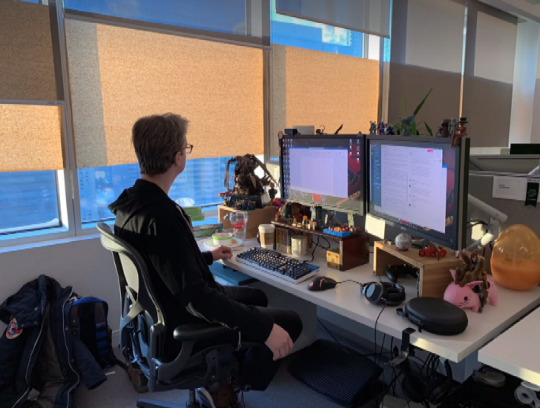
This slide shows a writer. Writing is an example of a role which is more able to work from home easily.
Their productivity did go down in the first month of the pandemic. After adaptations, some people then became more productive than they were before (this was role and personal situation-dependent, examples of this being artists and coders who were able to art and code at home without being interrupted, thereby being able to produce more). Covid has affected productivity in general, but this is part of our new reality. They have adapted and adjusted some deadlines. They have enough data (Scylla LOVES data) now to understand how long it will take them/how long they’ll need to launch the game. They have always had historical data for this purpose, but they’re doing more of this sort of thing now to ensure that they are doing things at the right time.
Remote hiring opens up the door to more talent joining, so if someone has talent geography will hold them back less. Some companies though may choose not to hire people from other countries due to labor issues, cumbersome legal aspects, time zones. But even in such cases there are activities for example that can be carried out while the rest of the team is asleep such as testing or working on the build, or there are cases where those companies still will want to hire a specifically/highly talented person even in spite of the potential legal aspects and so on.
On mental health: People were affected. There is the mental, physical and social impacts of the pandemic situation on people. EA supported them during the pandemic in terms of their mental wellbeing, there are specific companies (services offered, speaking to a therapist) that they can contact if they need something or help. EA had always been good at supporting them with this sort of thing but this has improved further during the pandemic. Another change was that they could/can take a couple of days off if they needed/need to because of the pandemic e.g. to take care of children, who were obviously not at school at the time. As a producer he had to be very mindful of all of this. How much they were monitoring peoples’ wellbeing really went up during the pandemic.
A question that was asked - in terms of DA4′s storybeats, is there anything in there that they decided to change due to the pandemic as it wouldn’t be sensitive or appropriate to include anymore, for example a plague plotline or something? Scylla’s answer is that DA and ME are games in which they try to have narratives that are relatable, which include things which people will identify with, so that players understand what characters are going through etc. Nothing in DA4′s plotline/storybeats has been changed (in the frame of this question, relating to the pandemic), as it didn’t have anything in it that could be specifically or a directly connected to a pandemic-type situation or anything. Of course the DA story has Blights and the Taint, but these are different & fantastical things and existed long before the pandemic situation. So this wasn’t the case with DA4 and there was no need to change anything, but this has happened to other games where they decided to change a storyline due to a strong correlation with something in the real world.
There were then concluding/closing remarks. The message he wants to send is that a crisis will always spark opportunities. Look at a crisis and try to see how you can grow.
-----
[☕ found this post interesting or useful? my ko-fi is here if you feel inclined. thank you 🙏]
#dragon age 4#the dread wolf rises#da4#dragon age#bioware#video games#covid mention#long post#longpost#wanted to write these up properly and post them yesterday but wasn't able to#mass effect#anthem
106 notes
·
View notes
Note
hiii delfi! good morning! your past abt the US and its shitty geography were the first thing i read today and uhh i'm not very informed on US geography so that was a lesson and a half lmao
anywayy u said u wanted to hear more country shenanigans so let me provide u with some bullshit that germany has to offer!
as far as shitty geography goes, we don't have too much going on because we're not that big. we have 16 states ("Bundesländer") in total, 3 of which are "Stadtstaaten" (=city-states) which basically means that they are both a state and the state's capital at once (those three are Hamburg, Bremen, and Berlin - yes, Berlin as in the capital of Germany). One thing that is kind of similar to the US and their north/south/west/whatever states is that we have three states that are called Sachsen (Saxony), Niedersachsen (Lower Saxony), and Sachsen-Anhalt (Saxony-Anhalt). I can't tell you why they're all called Sachsen, they just are. We also have a state called Saarland which is (jokingly) the Alabama of Germany. No idea where that joke came from but everybody likes to make fun of Saarland.
One thing that I personally find hilarious is that we have cities with the same names, too. My favourite example is Frankfurt. There's one Frankfurt that is a huge city, incredibly important, I believe the headquarters of the European Central Bank as well as a lot of other banks are situated in Frankfurt. But officially we call this gigantic important city "Frankfurt am Main" (Main is a river that Frankfurt is next to, "Frankfurt next to the Main") as to not offend some town with 10 times less inhabitants that also happens to be called Frankfurt (Frankfurt an der Oder, another river). We don't add the name of the state to specify the town like the US does, we take the nearest river or sometimes the administrative districts it's in (Haag in Oberbayern, for example, which is "Haag in Upper Bavaria").
Okay useless geography lesson over, now for the funnier bits! (idk why i even put all the geography here ooof sorry)
The most well known fuckery is probably the "Bielefeldverschwörung" (Bielefeld conspiracy). Basically, all of Germany has collectively decided that the city Bielefeld in North Rhine-Westphalia does not exist. Anything that might prove us wrong is simply the work of aliens. It's basically a meme that the entire country accepted as fact. Bielefeld does not exist. (The origin is that some college students in the 90's had a running gag about Bielefeld not being real and it caught on on the internet. The plan was to prove the conspiracy theories, no matter how outlandish they are, can and will be defended even if they are blatantly wrong. It's hilarious imo)
Another thing is the Sprachbarriere (language barrier? is that a thing?). Every state has a different dialect and even the districts have different dialects sometimes. Some of the dialects aren't that unintelligible but then there are others where you think you suddenly entered a different country because you simply don't understand anything. Yes technically, we all speak German. But the only actual universal language is hochdeutsch (=high german, which really doesn't mean anything other than "normal german").
There are so many dialects!
Personally, I'm from the south of Germany. Rural Upper Bavaria (Oberbayern) to be exact. Here, people speak oberbayrisch and it's sometimes impossible to understand - even for me, someone who has lived here all their life but doesn't speak it (because my parents aren't from here and don't speak it either).
There are other notorious dialects, like the Berliner Schnauze (can't think of a literal translation other than "Berlin snout" rn, it's basically just the dialect in Berlin), which might seem pretty rude and harsh to non-Berlin folks, but it's not meant to be rude.
Another example is Plattdeutsch ("flat german"?) which is spoken in the north. I don't know much about it but it sounds funny.
Then there is sächsisch. My favourite dialect of them all because i can imitate it and it's so funny. It's spoken in Saxony.
Another one that I like a lot is schwäbisch (=swabian). It's spoken in Baden Württemberg, particularly in central and southern Württemberg. It's pretty nuanced with several versions and it's almost impossible to understand tbh. Most of my family is from the Swabian Alb, so technically i should be able to understand it but oh boy do i have difficulties!
There are a lot more that i'm not talking about here tho because i don't know them!
With all those regional differences in language there are also some differences in what we call certain things and we WILL fight over those.
An example are bread rolls. You see, in Bavaria we call them "Semmel", in Baden-Württemberg we call them "Weckle" (i think that's how it's spelled but i'm not sure), in Thuringia we call them "Brötchen" (that's what i call them too), and in Berlin they're "Schrippen". I know I probably didn't mention all the versions but these are the ones i know. We fight about that. Daily. My family is a fun mix of Baden-Württemberg, Thuringia, and Bavaria, so everyday we argue about whether it's Brötchen, Semmeln, or Weckle. Nobody wins. (Brötchen are superior tho. Fight Me.)
The same thing happens for pancakes (Eierkuchen or Pfannkuchen) and another baked thing that I don't know the proper English name of. We call them Berliner, Krapfen, Pfannkuchen, Kreppel, Puffel, and probably so many other things lmao. Nobody ever wins but it's bound to start a fight.
Same thing goes for Nutella. German has three articles, a masculine one (der), a feminine one (die), and a neutral one (das). People will argue about the grammatical gender of Nutella. Personally I believe it's "das Nutella" and everything else is an atrocity.
Okay wow, I spent over an hour typing this up and it's probably so boring ahshasga i'm sorry delfi i didn't mean to dump all that on you!
omg yes thank you so much for taking the time to write all of this (an hour omfg), it was extremely interesting to read!!!!!!
okay so first things first, berlin is literally the best and i went only once but i honestly would love to move there, my only problem is: i have no clue how to speak/read german and from reading this it’s gonna be difficult even trying to learn (with all the different dialects)
skdhaksdhs so many sachsens oh my god, also does literally every country have an alabama???????? ours is santiago del estero lol
the Frankfurt case is nice tho, bc yes it is the same name, but they did the thing i like which is “virginia but to the left”, but with rivers gkfhgfsdfghj
i am SO sorry germans but Bielefeldverschwörung looks like a keysmash ashgdhasgdhsjgdkjasd I'm so sorry, also Bielefeldverschwörung??? i know no Bielefeldverschwörung (am i doing this right?)
having so many dialects is insane omg?? we have different accents here, not dialects. at least i’m not aware of argentina having different dialects, that’s mostly for argentina and other spanish speaking countries. for example in spain in they use coger in the to grab something meaning (i have been scrolling on my camera roll for about 15 minutes looking for the meme) (FOUND IT)

german is so nice to listen to, i actually listen to asmr zeitgeist’s german videos a lot because not understanding anything with the soft whispers make my brain go zzzzzzz
thank you so much for sharing all of these amazing facts!!! had a blast reading everything!!!
30 notes
·
View notes
Note
CAN WE GET SOME CPS LEARNING THAT THEIR S/O KNOWS ANOTHER LANGUAGE. LIKE THEIR S/O IS JUST LIKE SIGNING TO THEMSELVES OR MUTTERING SOMETHING IN A DIFFERENT LANGUAGE AND TOTALLY CATCHES THEM OFF GUARD
Sure thing love! Also sorry in advance for any mistakes, I only speak 3 languages and used google translate for everything else like a true dumbass😁😁
---------------------------------------------------
Jeff:
You were hanging out in his room, cuddling on his bed
Jeff rarely initiates affection so you were soaking it up
But because he's a little shit, he decided to be a dick for no reason smh
He suddenly pinched your side, eliciting a squeak
He laughed at the sound making you huff, irritated
He did it again, this time drawing a yelp out of you
You went to get up, but he just tugged you back down and then pinching again
Honestly what did you do to deserve this😩
You slapped his hands away and got up, beginning to mutter to yourself
You didn't even realize when you slipped into another language
"I swear to god...I just wanted to cuddle...sei uno stronzo (1)..."
Jeff could barely hear what you were saying but he knew that the last bit wasn't english
"What?" he asked, sitting up as well
"What?" you said back, not realizing what he meant
"What did you say?" he asked again, but he was not angry, just amused
???? You didn't have an idea what he was talking about, and seeing your confused face he pressed on
"The last bit of what you said, what language was that?" he continued
Oh, you flushed a little at your slip up
"Ehm...that was....uh...Italian..."you mumbled
"You know Italian?" he asked surprised
"We lived in Italy for a long time, sometimes I mix them up" you said and scratched the back of your head awkwardly
"That's really cool babe" he said and then asked "So what did you say to me?"
Uhhh...
Ben:
Your finals were coming up and you were spending a lot of your time studying
Ben was understanding enough and let you do your thing
But you've been studying for 4 hours now!!
Even for finals it was too much!
Apart from the fact that he needed your attention or he would die...again
^such a drama queen, but we stan✊
He knew that you seriously needed a break
With that in mind, he entered your room, finding you hunched over your textbooks as expected
He sighed when you didn't even acknowledge his presence
"Babe, why don't you come sit with me for a while?" he asked gently and smiled when you turned your head to look at him
You smiled at him, albeit a little apologetically and he knew that he'll have to try harder than that
"C'mon sweetheart, you've been at this for more than 4 hours now! You need a break" he said, whining a little at the end
He couldn't help himself, he wanted affection
"Plus tard, mon cher (2)" you responded without looking up
'Surprised Pikachu' meme😮
He recognized the language immediately
Having access on everything the internet had to offer had its perks
THAT WAS FRENCH!! HE DIDN'T KNOW YOU KNEW FRENCH!!!
"You speak French?" he asked astonished
You turned to look at him, and seemed to backtrack in your mind to what you said
"Yeah, I'm bilingual, my mom is French" you said and Ben's smile got even bigger
"Well, it's really hot" he said in return and winked, making you giggle and shake your head at his antics
"tu es un imbécile (3)" you told him and he frowned playfully
"Hey, I understand what you're saying"
E.J.:
You were helping him out in his lab
Moving things in containers, throwing stuff in the trash, labeling vials etc.
You both worked in silence, the only sounds were those of you moving things and occasionally your voice asking him where to place things and him answering
After about 5 minutes of silence you moved a vial with a clear liquid inside it above your head for him to notice and asked
"Πού πάει αυτό? (4)"
'Confused Math Lady' meme
"Excuse me?" he asked softly
"Είπα, αυτό πού πάει? (5)" you said again
Confusion intensifies ™
"What?" he asked again dumbfounded
You turned around to look at him and shook the vial gently to show him what you meant
"I asked, where does this go?" you said not realizing you slipped in another language
"Not, in this language, you didn't" he said and watched as realization dawned upon your features
"Shit, I asked in Greek, didn't I?" you said, looking annoyed at yourself
"Sorry, it happens sometimes" you continued without waiting for his answer to your question
The only thing Jack said was, "You can speak Greek?"
"Yeah, I pick up languages pretty easily, I already know French and German, so I thought why not?" you said and turned back to your work
Jack smirked to himself, suddenly more proud of you than he already was
Masky:
You were currently cooking for the both of you and he was helping
You knew Masky wasn't big on cooking nor was he the greatest chef, and that he was helping you just to spend some time with you
You appreciated it nonetheless, you knew his free time was limited
Plus you couldn't deny how adorable he looked confused when he didn't understand what ingredient you asked for
"Kannst du mir bitte das Salz übergeben? (6)" you asked softly and extended your hand towards him
Masky stared at the palm of your outstretched hand, then at the side of your face
Palm again, then face
Palm. Face
"Are you having a stroke?" he just uttered after a minute
You just turned and looked at him in bewilderment
"What? No. I just asked for the salt" you answered
"That was you, asking for salt?! I thought you were cursing me or some shit..." he exclaimed exasperated and then sighed before passing you what you asked for
"Oh, sorry I asked in German" you said and turned back to your cooking
"I didn't know you spoke German" he said and hugged you from behind
"There are a lot of things you don't know about me schatz (7)" you said coyly while lowering your voice, causing Masky to chuckle
"You keep secrets from me?" he asked with a teasing tone and tickled your sides a bit making you giggle
"Not anymore" you answered him and turned your head to watch a gentle smile stretch across his face
Hoodie:
(first of all, let me say that I believe as a hc that Hoodie knows sign language, thanks for coming to my Ted talk)
He was sure he's seen you do it before in passing
It was during a conversation you had with Jane
He saw your hands moving when you said certain words, but the action was so miniscule and fast and he didn't quite catch it from where he was standing
He's been watching you closely for a week
Just to see if you would do it again
You both were making light conversation while lounging in the living room with you trying to fix one of your bracelets that recently broke at the clasp
"Help me?" you eventually said and Hoodie clearly saw your one hand making a fist on your other's open palm and then moving upwards (8)
You just signed the word for 'Help', he knew it
"You know sign language?" he asked instead of answering and you turned to look at him, surprised he knew what that was
"uhhm, yeah, I do" you said and turned back to your broken bracelet, a little embarrassed that he caught you slipping
"I do too" he said and this time you turned sharply to look at him buffled before your face broke into a grin
'Spiderman Pointing at Spiderman' meme
"How long have you known?" he asked eagerly
He wanted to know more about your connection to the trait you both seemed to share
"My brother was deaf since birth, so I've learned to sign when I was 6" you replied with the same giddiness as him
"Now are you gonna help me?" you continued and smiled even brighter when you saw him raise his fist, back of the hand facing up, and move it downwards (9)
"Yes"
Toby:
You rushed towards as him as fast as you could when you saw he was about to have a panic attack
He's been stressing about a mission lately and it was finally getting to him
He was on his knees on the floor, struggling to breathe and eyes darting around frantically
You fell on your knees before him, but still far enough so you wouldn't touch him
You knew Toby needed his space when he was in the middle of a panic attack, so you always let him get close when he wanted
Instead you made sure he looked at you in the eyes and focused on your composed movements
"Relajarse (10)" you said as calmly as you could
"Respirar (11)" you continued and inhaled deeply before exhaling, making sure Toby could follow your actions
Soon enough he was breathing normally again and moved to hug you
You reciprocated the hug while carding your fingers through his hair
The time you spend hugging gave Toby enough time to replay your words in his head
"What language was that?" he asked softly after some time
"Spanish" you replied and you could practically see him pouting before he continued with the question you anticipated
"You never told me you could speak Spanish" he said with a slight whine
"You never asked" you said with a chuckle
He moved his head from your shoulder to look at you, pout wiped from his face, an eager smile replacing it
"Can you teach me?" he asked excitedly
You couldn't possibly deny him something when he looked at you like that
"Sí (12)"
(1): Sei uno stronzo= You are an asshole
(2): Plus tard, mon cher= Later, my dear
(3): tu es un imbécile= You are an imbecile/idiot
(4): Πού πάει αυτό?= Where does this go?
(5): Είπα, αυτό πού πάει?= I said, where does this go? (I'm Greek btw lol)
(6): Kannst du mir bitte das Salz übergeben?= Can you pass me the salt please?
(7): schatz= sweetheart/dear
(8): sign for 'Help'
(9): sign for 'Yes'
(10): Relajarse= Relax
(11): Respirar= Breathe
(12): Sí= Yes
#Creepypasta#Creepypasta x reader#Jeff the killer#Jeff the killer x reader#Ben Drowned#Ben Drowned x reader#Eyeless Jack#Eyeless Jack x reader#Masky#Masky x reader#Hoodie#Hoodie x reader#Ticci Toby#Ticci Toby x reader#Creepypasta headcanon
663 notes
·
View notes
Text
talkin bout fuckig manga
hey it’s me, haven’t had internet for over a week and i’ve been sick and uni and blah blah blah time for a rant about manga
this time its about "Soredemo Machi wa Mawatteiru", tl;dr, good manga read it idk
lots of bullshit below the cut
Before anything I say gets too confusing or I go off on an insane tangent, just know my recommendation is that you read "Soredemo Machi wa Mawatteiru". It's not very easy to find online since it has an official English release (which my recommendation extends far enough to suggest I might pick up in the future, just to have it, but I am very stingy), but there's an alright torrent of all the volumes on your local anime torrenting website, and is at the very least worth the trouble of reading as such. There is also an anime that gets better as it goes, but the manga is my primary recommendation. Beyond this point I'm not gonna give much regard to what I write, so get ready for anything, read the manga and see if you agree with me, or don't and see if I care:
BOUT THE ANIME: The SoreMachi anime is one of those rare comedy anime you find where the animation and overall production is just really extra the entire time. Hopefully you know what I mean because I won't really be able to explain it any other way, it's simply one of those shows where the jokes are decent and it's a fun time for the most part. Unfortunately, the anime makes a couple of critical missteps that kept me from getting far into it when I first tried watching it about a year ago, and in retrospect seem even less reasonable.
Starting with the good, as an adaptation it does a good job with most chapters it covers, it properly sources where each chapter comes from incase you intend to read the manga and skip around to catch up, and the anime adapts some sections to have additional jokes that fit very naturally in to the story. It also covers up some of those problems only manga can have like having a concert segment without any actual music involved, until they invent mp3-paper it's just something we'll have to live with. Translation work was pretty good (I watched the [WhyNot] release for those who care), which is extra important for something as difficult to translate as jokes from another language. The set of episodes they chose to end on was very good, and was expanded to be a lot more impactful in the anime. If it wasn't for the last episode being as strong as it was I may have given up on finding the manga when I saw it wasn't super easy to read online.
As for what the anime fails in, some episodes feature some really blatant over-acting that doesn't really help make characters believable, and there's this obnoxious gag that continues the whole where through where most scenes have a few seconds long line from what is essentially a forced mascot character, which usually mean nothing and only serve to harm the pacing of many episodes (there isn't even any sort of equivalent bit in the manga so I really don't know why they did it, most of the anime original jokes are pretty good so I just really don't get it). The biggest issue the anime faces is that the source material is about 140 chapters, while the anime is only able to cover 24 chapters. This comes with a LOT of problems, the first being what I'd call the "required reading". SoreMachi is not a 1-note simple comedy where you can skip to any chapter and be completely okay; There are many small but meaningful subplots lying beneath, and characters have a fair bit of development throughout. What this means for the anime is that the first 3-4 episodes are just the first few chapters of the manga, which are a bit rough and not as good as the majority of the work, which is true of a lot of comics (god fuck I promise there will be more than a first chapter of my comic I promise it'll get better fuck). In terms of the anime by itself, I'd say episode 1 is decent, 2 is middling, and by 3/4 their still taking a while to introduce members of the cast, and I didn't immediately want to finish it. I put the show down for a long time until my internet started dying and I wanted to watch something fun. Slapping it back on at episode 5 I immediately had a great time and watched the rest of the show pretty soon after. While I understand the reasoning behind doing this, the anime does not pay off this structure, as beyond the first few episodes, the chapters start being presented out of release order and out of chronological order, kind of destroying any consistent throughline. This decision in and of itself isn't the worst, since the comic isn't always chronological, and the volume ordering is a bit different from the release ordering, but the inconsistency makes the first few episodes feel lessened without reason. The other large failure that comes with only animating about 1/7th of the entire work is that many themes and concepts that are core to the manga are not represented in the anime well at all. One of the biggest is the rare but unnerving supernatural chapters, of which only one is animated, and not a particularly good one. In order to talk about these themes I'll have to transition into talking about the manga itself, since they aren't part of the anime.
DA MANGA: So one last recommendation that you read the manga, the whole damn thing. Cus we're gettin into themes and character moments that take a long time to pay off, and obviously is all part of my interpretations, so if that stuff means anything to you don't let me ruin it for ya.
The title of the manga is, in essence, the entire manga's "punchline" in that every chapter could meaningfully end with simply the text "And yet the town still turns..." (My translation of the title, fuck "And yet, the town revolves" or "But the town moves"); by this I mean most chapters end in an anti-climax where a mystery is left unsolved, or a mystery is solved and undercut by the realization that life simply keeps on going without much change. This is used to essentially force your eyes open to all possibilities when reading, as the main character spends her time acting like a detective, and these mysteries end up as either misunderstandings, secrets, riddles, and sometimes something out of the ordinary happens that makes you unable to pin anything down firmly. Similarly, these endings aren't always read-and-forget scenarios. Several chapters come back in the form of a continued joke, a continued mystery, or contribute to some greater purpose later. Readers are properly rewarded for keeping everything they can in mind, while also tormenting such people with loose ends.
I enjoy Hotori as a protagonist due to her character being defined not in flaws and strengths, but in mindedness. Hotori seems like a simple "haha she's dumb" character to start, but consistently throughout she proves that her strengths are in memory, observation, and deduction, while lacking in some more common sense and abilities. Her brain works in strange ways that some people may or may not understand, such as her need to think through even the most trivial fictional scenarios, which I relate to deeply.
The art and paneling throughout are wonderful. Ishiguro Masakazu is one of those artists who draws very simple characters, but knows how to use details and depth to breath so much life into the artwork. He also clearly uses the occasional supernatural happenings as an excuse to draw what he loved, as all sorts of artistic depictions of the supernatural come out that simply look satisfying. These parts obviously meant a lot to him since he's been working on a primarily mystery-action manga that has a lot more of that stuff in it. (Also, as hindsight is 20/20, if you've read any of his new work you'll notice that the main character of it is eerily similar to a character who shows up very late in SoreMachi that the author obviously fell in love with, cus she just keeps coming back and even ends up with a really unsettling end to her character arc despite only being introduced as a component in a harmless mystery. Feel free to call me out for the same shit 30 years from now when I'll probably do the same shit)
I'd like to get into some of the major themes of this work, as a lot of them hit very close to my mind (which I guess is true of any theme you recognize for yourself, you wouldn't really "get it" if it didn't mean something to you...).
The simplest theme, again, comes from the title. The main character, Hotori, expresses a desire that the town she lives in continues going on, unchanged forever. This is obviously a fear of change, which ya know, same, but also an exploration of what it means to fear change. Hotori actively tries to keep businesses from closing down, keep friends from leaving, and keep relationships from changing, while simultaneously making all sorts of new relationships and solving mysteries. Hotori even comes to realize that simply learning the truth about something changes the world through your own perspective, and that such changes can't be undone. In spite of this, Hotori mostly gets her wish, any time she fears that a large change will impact the town, its resolved about the same as any other issue. Whether its a message that even time can't keep you from your loved ones and that change isn't worth fearing, or a concession that large changes to the setting would be a bad idea in terms of humor, I can't really decide. This theme reaches it's conclusion in what is one in a series of "ending" kinda chapters at the end of the series. Hotori is faced with a supernatural ethical situation, save her town from destruction at the cost of her existence, or live through the disaster, knowing her town and the people in it will forever be changed. While the actual result is that nobody disappears and nothing is lost, and the event may have simply been a strange dream, Hotori confidently decides that sparing the people in her town from a life altering event is worth giving up her memories with them. A kind of bold spit-in-the-face to the idea that change is okay, where we find that Hotori didn't fear change for herself, but rather for the people around her.
There's another major idea in this manga, which takes a very long time to pay off, and completes its arc at the very very very actual end of the series, the idea of "leading someone to be something". A character that rides that line between main and side character, Shizuka, is a writer of detective novels, who feels the best person to judge her works would be a version of herself without the bias of being the author. She tries to achieve this by leading Hotori to be interested in detective works (including her own) and generally be just like her, starting from a young age. The end result is a young girl dead set on being a detective herself (or at least another novelist), while Shizuka keeps her identity as an author secret. She then uses Hotori as a scapegoat for herself, attempting to see how she would solve various mysteries and use that as inspiration, and this is depicted as though Shizuka were some sort of villain, which she may feel like she is. The end result of it all, though, is that Hotori was likely already a detective-minded person, and that even if Shizuka pushed her down that path, it was Hotori's decision to continue down it, and the very end of the manga is a scene revealing that Hotori figured out Shizuka's secret at some point, and even still respected Shizuka and aspired to reach her, and the two accept each other for who they are. I enjoy this ending a lot, since as an artist I've worried that some of my love or aspirations for and from other artists came with an ulterior motive of wanting a better community for art to exist in, but people are people and will make their own decisions, and some day everyone may be able to become equals in a truly meaningful sense, where everyone is inspired by and guiding each other together.
So that probably didn't mean shit to nobody and I didn't even really talk about anything in the comic like most of the main characters or any of the shit goin on but ya know fuck you go read it, and thanks for reading this.
#long ass post#also gonna have finals on my birthday this week so awesome#im having a good time this year h-haha
24 notes
·
View notes
Text
Website SEO and ranking any website in less than 2 months
Ranking a Website and website SEO .

The process I would say is as follows
Buy domain with keyword in the title / URL- Google domains
Get hosting on a super fast host / Green geeks / English support for your website 24/7 / Simply amazing service.
Get wordpress - the rest are tedious - second option is a landing page I recommend another builder for small one page sites called swipe pages
Get a GMB - Google my Business profile - its Free and from Google and can be operated from your smartphone
Get Citations on fiverr - biggest draw card in local search - NAP being consistent.
Learn Basic SEO and web page optimization via the Moz Pie chart - This is your bible
Get a tracking software as you start your journey - Brightlocal $49 per month and you can help out 5 other businesses once you've taught yourself ...
Use the Semrush - Moz - Ahreffs free trial periods to learn SEO to a higher level
Build up your portfolio - get reviews for your GMB listing ,Facebook reviews ,Trustpilot reviews, be religious about this
Using Google analytics , free from Google analyse your traffic and see what content - search terms are relevant to your industry and site and add these with Fiverr to your site - get content written on Fiverr
Level Up - Get the paid version of Semrush - search your competitors back link profile
Brightlocal ( has a great citation checking service ) or you can properly check your competitors sites and emulate their strategy , get the same back links as them and get the same citations
Get reviews and add widgets to your website from Trustpilot - Facebook - and GMB widget - Wordpress has all these plugins to add widgets for free .Its proves multi platform credibility

Let me say from the start I knew nothing about ranking a website!
Well, I do now, but I did not when I started. I'm an electrician by trade.
The way I got into SEO has been a 3 year long journey .
I run my own electrical install and testing company -www.zaelectrical.com
The company struggled to rank on first page and the Google map pack / snack pack
This was a problem I wanted to solve. How do I, a one man band, compete with established companies who have 20 + staff members and a budget of £2000 per month and then some?
Well, short answer is "Yes, you can!", but it took lots of research and trial and errors.
At first, I gave up.
I was interested in taking a stab at internet retail and I attempted selling products on Amazon in the USA.
9000 meters of climbing rope - 10m/ 20m /30m denominations / Unbranded
650 units of climbing chalk / Branded - XLR8
400 units of unbranded climbing chalk
I was out of my depth and had to study PPC via YouTube videos and it felt that I was fighting a losing battle. I barely broke even after Amazon's storage fees and monthly charges and charges for delivering my products from their warehouses. They also lost some of my stock ...
I then tried Shopify and the drop shipping model combined with Facebook ads
This gave me back a glimmer of hope that online sales were the way forward again , seeing the metrics of the impressions of advertising on a platform that works - Facebook
I eventually broke even, well sort of and vowed not to give up , but to take these lessons and try and apply the correct PPC to my business in the UK
ZA Electrical Ltd
OK, so here the journey technically starts:
Lots of videos on YouTube later
SEO experts - £200 a month for 4 months
Wiring up a friends house , which caused numerous rifts - in exchange for a website
Re-doing the website again myself with help from a person on Fiverr
And then having to do it again with help from a friend I met through a work contact (He informed me that he was doing the bare bones site after I had given him an outline explaining that I had been let down time and time again)
He pulled the site together. Amen
I had super ambition and hoped it would rank immediately
Talk about living in a dream
I started to study with the same ambition I had applied to Amazon , every night after my day work I would study
Then things started to make sense to me.
You can't beat what already has been done - big companies can out budget you and out staff you every day of the week
So DO NOT reinvent the wheel I thought
What are they doing and how is that working ?
This is where having the right tools is my only chance, I decided.
Get a domain from Google Domains with the main keyword in the title
Get a domain Host from Green Geeks - the fastest Host and 24/7 Helpline
The first thing I learnt is Google My Business - GMB
In the UK you have a big authority for trades called Checkatrade with unlimited budget and 2 million back links - Yes, 2 million
You wont beat these people so ...
Emulate - and over ride them
Step 1 -Cue- Moz Pie chart

This is a gem and started me on the road properly. It basically gives you a % of every item on the checklist to be completed for local and organic map positioning
So during studying I learnt the basics are ...
Buy a Domain on Google domains with your keyword in the title
Purchase hosting on a superfast Host - Green Geeks
Links and Authority
Google index Count
Link count
Linking Domains
Majestic C Flow
Domain Authority
Website age
Rank Checking
Google
Google Mobile
Google Maps
Bing
Bing Local
Google My Business
This is claiming your business on the GMB app and building your profile.I will elaborate further down on this Blog .
On site SEO of your Website
Page Load speed
Robots.txt
XML Sitemap
Errors
Internal links
URLs
SSL
SEO
Page Titles
Page descriptions
Open graph tags
Twitter card tags
Image alt tags
H1 Tags
Word count
Flash
Responsive design
Mobile friendly
Mobile load speed
Mobile rendering
Content
Address
Phone number
Schema.org Markup
Top Keywords
To do this I had to find a program that is both easy to navigate and understand I highly recommend BrightLocal
The process after getting my website to a reasonable level was to order citations on
Fiverr
The more niche, the better.
I recommend looking at your top competitors with
Brightlocal
and matching or ordering more citations through either
Brightlocal
I also looked at
Fiverr
, which is by far the cheapest option, but you have to research credentials and levels.
Look at your top competitors' keywords and then optomise your GMB listing together with your website to match those keywords and get content written for you on
Fiverr
, again check the sellers' credentials and level.
Backlinks ...Well, well, well....
This is not a quick process , the citations you order will help get backlinks too, but the quickest way is to ask other sites in your trade / profession to reference your site. This was my route on a budget, however there are so many ways. Google does not love you if you buy them and this is against their terms and conditions, so buy them on
fiverr
at your own risk. Just saying.
I had to teach myself a bit about Wordpress, which seems from all accounts the easiest to self teach, with tutorials on the web, also the SEO and range of plugins, both paid and free, outweigh any other website builder by a mile - this was a big thing for me anyway.
I would work on my reviews from each customer and once I started to see I was approaching 70+ reviews I started to see my rank increase in the local rankings for "near me" search terms
T
Step 2 Study some more - a different set of tools
You tube - greatest invention of the 21st century
I would need to learn about my GMB listing and how to maximise it
Step 1 I had started - Logo - reviews - regular photos - weekly posts - Geo located and alt tag stuffed photos
step 2 study - Greg Gifford - what a genius
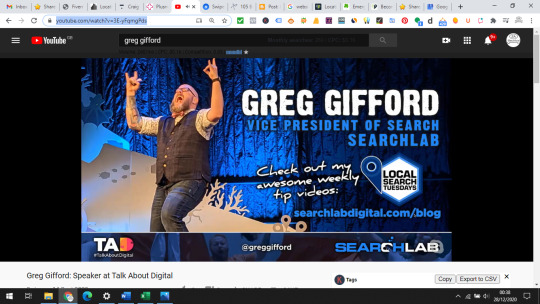
Step 3 - better analytical tools - Semrush -
This tool has a free trial period so if you want to try it you can cancel within the cool off period without being charged
Armed with a new arsenal I felt much more confident .
I can still see my DA is only 16 but my other signals - local authority and citations and reviews , outweigh my competitors ,after altering my rich snippets , SEO title , Slug , meta description ,featured image of the rich snippets alt text ,title , captions, descriptions ,
My rank shot up
So what I've learnt is that you can rank any website by starting locally then moving to a wider audience you can rank any website with the right tools.
This is the process and steps I took
I'm currently bouncing between 1-2 position on Google maps and 2nd and 2-3rd position on organic rankings on Google .
Have fun and good Luck on ranking your website Everything you need is at your fingertips !
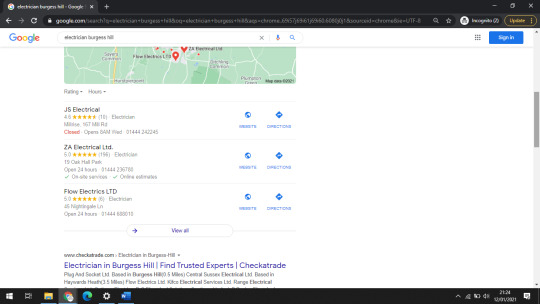
D R Mac Donald
www.connectseo.uk
https://www.google.com/maps?cid=2908312518549373095
please contact me directly for help !
Whatsapp +44760037733
1 note
·
View note
Text
I ALREADY DID A SIMILAT ONE OF DESE BUT FUCK IT!!!!!!! IM DOIN THIS AGAIN!!!!!!!!!!!
TAGGED BY @bitter-cherry-bastard AND @pyrrhiccascade!!!!!!!!!!!!!!!!!!!
NAME: ALEX!!!!!!!! IT HAS EX IN IT. SO DOES SEX. MORE PROOF I AM SEXY
NICKNAME: AL. ALSO GAYASS. ALSO ‘THAT MOTHERFUCKER OVER THERE’!!!!!!!!!!!!!!!
ZOE DICK: IDK ABOUT ASTROLOGY BUT. AQUARIUS MF SUN OR SUM SHIT. ALSO LIBRA MOON!!!!! AND TAURUS RISING. ALSO I TALKED 2 MY FRIEND WHO KNOWS ABOUT ASTROLOGY AND SHE SAYED MY VENUS IN ARIES MAKES ME THE SEXIEST FUCK ALIVE. SHE IS RIGHT ❤️
HEIGHT: 5’ 4ISH????? IM SO ANGRY I AM SO FUCKING MAD
LANGUAGES: ENGLISH . ALSO BOTH MY PARENTS SPEAK GERMAN SO I HAVE A LIL BIT OF THAT. I WANNA LEARN MORE GERMAN THO WTF!!!!!!!!
NATIONALITY: AMERICAN CRACKER
FAVORITE SEASON: SUMMER!!!!!!!!! FALLS A CLOSE SECOND HOWEVER. BUT FOR ME. NOTHING BEATS SUMMER OH MY GOD
FAVORITE FLOWER: MARIGOLDS MARIGOLDS MARIGOLDS FUCKING!!!!!!! AAHHHHHHHHHH ALSO CALIFORNIA POPPIES AAAHHHHH
FAVORITE ANIMAL: HYENAS!!!!! ALLIGATORS!!!!!! CATS AND BIG CATS!!!!!! BATS!!!!!!! BIRDS!!!!!!!!!!!! ALSO. ALL OF THEM!!!!!! ESPECIALLY WILD ONES!!!!!!! FUUUUUUCK
FAVORITE SCENT: OH MY GOD. THE SMELL OF VINYLS AND THE OLD PAPER INSERTS THEYRE IN. FIRE!!!!!!!!!!! AND WHENEVER IM COOKING!!!!!!! ALSO. WHEN IM HUGGING SOMEONE AND I CAN SMELL TGEM .. IT IS NICE
FAVORITE FICTIONAL CHARACTER: IDK I DONOT CONSUME MEDIA BUT. I LOVE DA ANIMAL CROSSIG CHARACTERS AAAAHHHHHHH
COFFEE, TEA, OR HOT CHOCOLATE: HM . I DO NOT TYPICALLY LIKE HOT BLACK COFFEE AND HOT TEA BUT. IF THE TEA IS COLD AND THE COFFEE IS EITHER COLD OR HAS CREAM AND SUGAR THEN MAYBE I WILL DRINK IT. ALSO!!!!!! I LOVE HOT CHOCOLATE
AVERAGE SLEEP: LIKE FUCKING????? 6-8. I WISH I COULD SLEEP MORE. HMM ..
FAVORITE COLOR: OH MY GOD. OH MY GOD IH MY GOD. RED AND ORANGE. AND SCARLET!!!!!!!!!!!!!!!!!!!!!!!!!!!!!!!!!!!!!!!!!!! BUT I LOVE ALL COLORS SO MUCH FUCK FUCK F!!!!!!!!!!!!!UCK
DOGS OR CATS: HM. KITYS
NUMBER OF BLANKETS: ONE. THAT IS IT
DREAM TRIP: IVE ALREADY BEEN BUT. OH MY GOD CALIFORNIA!!!!!!!!!!!!!!!
BLOG ESTABLISHED: FUCKING. SUMMER 2019
RANDOM FACT: I WANT TO KISS MY FRIENDS .
GENDER: MALE MOTHERFUCKER!!!!!!!
SEXUALITY: IM. I AM SO FUCKING HOMOSECUAL. SO FUCKING HOMO SO FUCKING GAY I FUCKING. SEE A BOY I GO APE SHIIT
HARRY POTTER HOUSE: SOMEONE SAYED I WAS GRIFF AND DOOR ONCE!!!!!!!!!!!! WTF. WTF IS HARRY POTTER
WHERE ARE YOU FROM: VIRGINIA AKA VIRGIN LAND AKA TRIANGLE STATE AKA SHITTY INTERNET AKA NO GAYS EXCEPT ONE. ME
WHY DID YOU START THIS BLOG: I WAS LIKE. OH MY GOD TUMBLR WTF. AND HIT SIGN UP
MOST RECENT ALBUM PLAYED: TALKING HEADS: 77. WHAT THE FUCK!!!!!!!!
TAGGING WHOEVER WANNA FUCKING DO IT!!!!!!!! BUT ALSO. @moonrocksz AND @treehouse-of-horror ALSO @molaynnaise!!!!!!!!!!! I LOVE YOU FUNKY LESBIANS!!!!!!!!!!!!!! AAHAHHHHHHHHHHH
5 notes
·
View notes
Text
The House That Dripped Blood (1971)
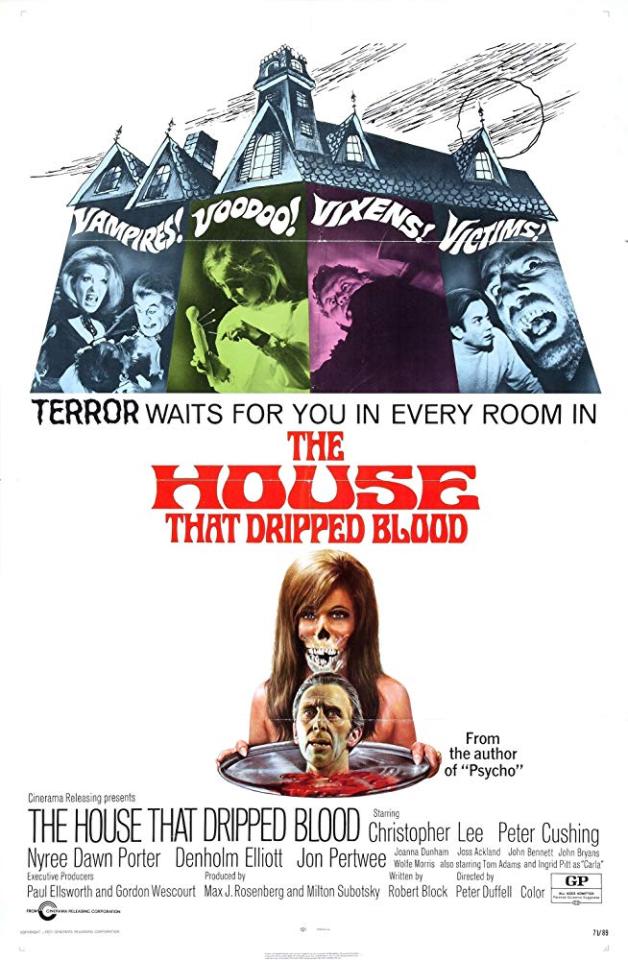
Directed by Peter Duffell
Screenplay by Robert Bloch
Music by Michael Dress
Country: United Kingdom
Running time: 102 minutes
CAST
"Framework"
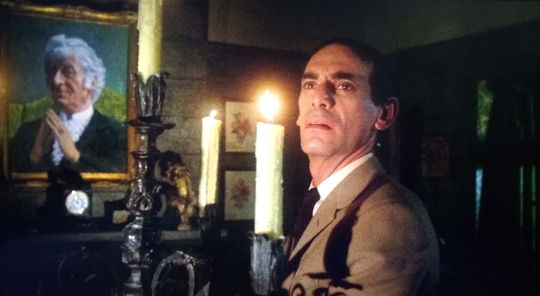
John Bennett as Detective Inspector Holloway
John Bryans as A.J. Stoker
John Malcolm as Sergeant Martin
"Method For Murder"
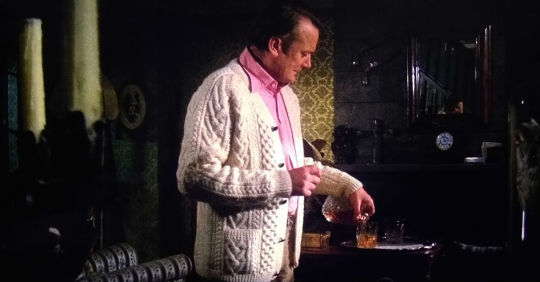
Denholm Elliott as Charles Hillyer
Joanna Dunham as Alice Hillyer
Tom Adams as Richard/Dominic
Robert Lang as Dr. Andrews
"Waxworks"

Peter Cushing as Philip Grayson
Joss Ackland as Neville Rogers
Wolfe Morris as Waxworks Proprietor
"Sweets to the Sweet"
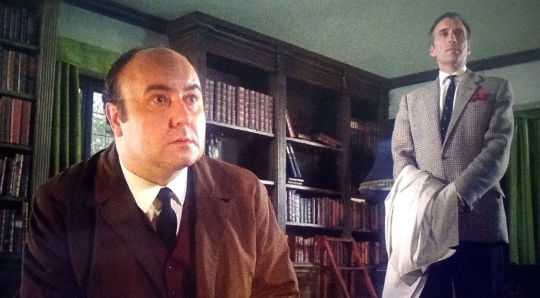
Christopher Lee as John Reid
Nyree Dawn Porter as Ann Norton
Chloe Franks as Jane Reid
Hugh Manning as Mark
Carleton Hobbs as Dr. Bailey
"The Cloak"
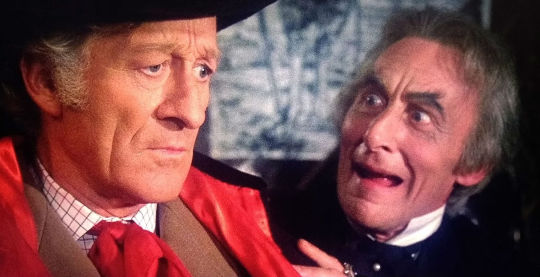
Jon Pertwee as Paul Henderson
Ingrid Pitt as Carla Lynde
Geoffrey Bayldon as Theo von Hartmann
Jonathan Lynn as Mr. Petrich
NB: I watched this via the 2019 Second Sight UK Blu-Ray release and the picture is really fantastic (technical term there). So, if you were wondering, now you know; this is the copy to own.
The House That Dripped Blood is a British 1970s anthology horror movie from Amicus, and I make no bones about the fact that I am totally partial to that jam, pal. I grew up watching these movies, from a ridiculously unsuitable age, on Friday and Saturday nights with my mum while dad was down the pub. Their ridiculous delights are fused into my brain by the flame of nostalgia, more thoroughly even than those of ‘70s Jonah Hex comics. (And ‘70s Jonah Hex comics are pretty fused in there too. Tony DeZuniga; he da boy!). You came to the wrong place for impartiality, basically. The House That Dripped Blood is horrortastic.
Putting the lie to the spectacularly enticing title there is no actual blood in The House That Dripped Blood, but there is definitely a house. And it’s around this house that the four fear inducing stories revolve. But every proper portmanteau demands a framing device and so the movie starts with the arrival of uppity Inspector Holloway (John Bennett) who has been dispatched by Scotland Yard to investigate the disappearance of horror movie star Paul Henderson (Jon Pertwee) from The House That Dripped Blood. Obviously the house is never referred to as “The House That Dripped Blood” as that would put prospective tenants off; bit of a real estate tip there for you.
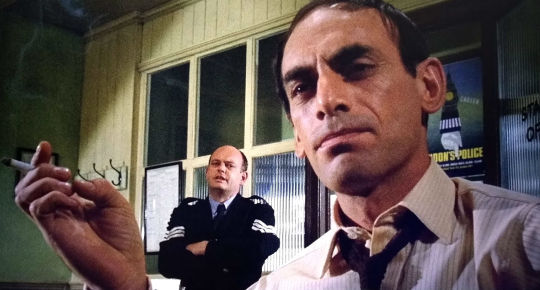
Unlike most police investigations, Bennett’s takes the form of people telling him far-fetched stories about the previous occupants as though this might give him a clue as to Henderson’s fate. It’s an interesting approach to policework. Luckily, Bennett, a copper singularly lacking in ratiocination, at no point even begins to wonder how exactly the people telling him the stories know what happened, since most of the people who could have told them end up dead or insane. The answer would be that these are a bunch of punchy shorts scripted by pulp wonder Robert Bloch and the house is just a big old McGuffin to hang them off. And learning that might be a bit too meta for a common movie plod to handle.
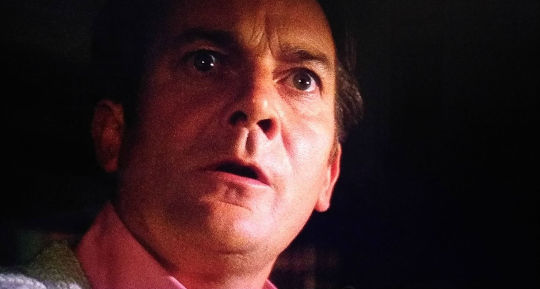
First up is Method for Murder wherein debonair horror author Charles Hillyer (Denholm Elliot) rents the house to get some peace in which to write another of his (apparently terrible) potboilers. Unnervingly Hillyer’s new opus concerning Dominic, a strangler with a bowl haircut and British Teeth©™®, starts to bleed into his reality, and the possibility that he may be losing his mind may not be the worst option on offer. Denholm Elliot (1922 – 1992) was never a star, but he was a fantastic actor all round; his particular forte was a kind of nervy self-assurance constantly on the cusp of crumbling into wild-eyed desperation. The kind of thing it takes a lengthy, poorly constructed sentence to describe in English but in German is probably encompassed by a single word that sounds like someone cheerfully stamping on chicken bones. Elliot’s very good at it, whatever it is, and he gets plenty of chance to demonstrate it here, as Bloch’s plotting turns the screws until he pops. Everyone else is very good, particularly Robert Lang as Dr. Andrews, who is the perfect oily 1970s personification of a psychiatrist. And it would be remiss of me to omit to mention Denholm Elliot’s superb salmon pink shirt. Personally, I find fashion is one of the finest characters in British ‘70s horror movies, and in The House That Dripped Blood fashion is on fine form.
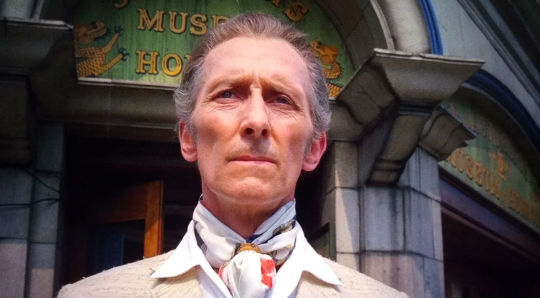
As is soon apparent in Waxworks when Philip Grayson (the always marvellous Peter Cushing) sports a spellbindingly classy cravat and jacket affair. His gobstopper red smoking jacket is also quite special, but it’s the cravat ensemble which carries him through most of the episode and takes the trophy. This eerie creepster is about a retired financier who rents the house to brood while listening to records and looking at a photo of a woman from his past. When he isn’t posing by the weir in a melancholy way Philip walks into town where there are actual shops (this is before the Internet and 10 years of Tory government had reduced the English high street to charity shops, boarded up windows and Gregg’s The Bakers) and finds the world’s most morbid waxworks. Haunted by the display of Salome (who is supposed to look like the lady from his past; you have to take this on trust since the waxwork isn’t exactly life-like) Philip is visited by his old chum Neville (the ever forthright Joss Ackland), who has a penchant for neck scarves that resemble an acid trip made silk. Both men have the woman in common but prefer to elliptically skirt around the troublesome issue and pretend it doesn’t matter anymore; Bloch knows nobody does emotional cowardice quite like the English. Soon Neville meets Salome too and the blokes race each other to the horrific finish. Joss Ackland is great, obviously, but it’s worth noting that, as ever, Cushing puts in a performance far more moving and tragic than the material deserves, and so makes it sting all the more. Fans of ‘70s unconscious misogyny might risk getting all turgid since Waxworks is all about a woman who ruins men’s lives but doesn’t actually feature a real woman. Ultimately though such people will have to go home empty handed as it’s clearly the men doing it to themselves and blaming it on a woman, which is a pretty clever bait and switch by Bloch.
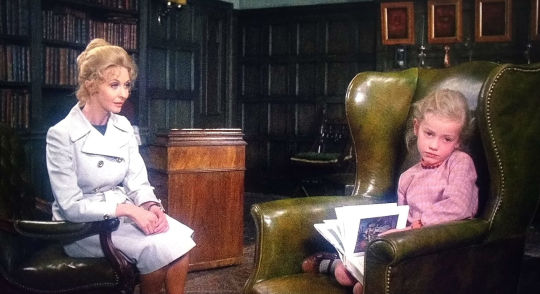
Bloch’s quietly understated intelligence is even better demonstrated by Sweets to the Sweet which looks like it’s about witchcraft but is actually about the damage a lack of love can do to a child. Widower John Reid (Christopher Lee) moves into the house so he can commute to the city and do his business in whatnot and whathaveyou and have his child Jane (Chloe Franks) home-schooled in a controlled environment. Reid is all about control and Christopher Lee is ideally suited to the role, bringing all his not inconsiderable clipped prissiness to bear without totally eliminating Reid’s humanity. Reid loves Jane but he also fears her. But why? (why does he fear her, not why does he love her; c’mon, people, work with me here). It’s a conundrum Jane’s newly appointed teacher Ann Norton (Nyree Dawn Porter) unwisely seeks to solve. Plenty in this one to chew on viz a viz kids, parental responsibility and the need to keep a close eye on candles and razor shavings. Probably enough for a dissertation in fact, but, putting the chalk and elbow patches to one side, it is mostly about witchcraft because that’s spooky fun; no one wants to watch an unvarnished 20 minute segment on the emotional abuse of a child in a horror movie. That’s what Home Alone (1990) is for.

Seeking to send the audience out into the ‘70s night to catch the last bus on a bit of a high, the final terror tale, The Cloak, spoofs about in an enjoyably goofy fashion. Prima-donna horror star Paul Henderson (Jon Pertwee) moves into the house to be near the filming of his new (apparently terrible; probably based on a script by Charles Hillyer) movie. Being a great believer in authenticity and disappointed by the cloak provided by the doddering wardrobe mistress, Henderson sources a suitably eerie item of attire from Theo von Hartmann (Geoffrey Bayldon), a ridiculously freaky tat shop owner with a suspiciously Teutonic moniker. When wearing the cloak Henderson’s portrayal of a vampire becomes a little bit too authentic for comfort and he learns a steep lesson in the Hollywood food chain from his comically pneumatic co-star Carla Lynde (Ingrid Pitt). It’s slight stuff but pretty funny with everyone camping it up like a cub scout sleep out will be arriving imminently (camping; tents; scouts; c’mon, folks). I vaguely recall reading that Pertwee claimed the whole movie was supposed to be in this mirthful mode, and that he based his character on co-star Christopher Lee, but didn’t tell Lee (obviously). If I ever get the time to wade through the multitude of extras on the Blu-ray maybe I’ll find confirmation. As it is, watching the movie was pleasure enough for now. But like I said I’m practically marinated in this stuff. Nevertheless I persist in the belief that people who haven’t been knocking about for half a century would still find something to enjoy in The House That Dripped Blood; even if it’s just that cracking picture quality.

#The House That Dripped Blood#Movies#Horror#Anthology#Amicus#Peter Cushing#Christopher Lee#Denholm Elliot#Nyree Dawn Porter#Robert Bloch#Peter Duffell#1971#The 1970s#United Kingdom#Ingrid Pitt
22 notes
·
View notes
Text
Sarauniya “ Sara ” Davies, 24, pansexual, cisfemale, ISFP Enneagram 9w1; Pisces sun, Sagittarius moon, Pisces rising 1st year Advanced Encryption Major; did not go to a spy prep hs
Imma keep it real with you, chief, I have absolutely no idea what’s going on. I mean, obviously, I know what espionage is ; I’ve read books and articles, and I’ve seen Spy Kids and all the Charlies Angels and James Bond movies, but I genuinely think I need a minute to wrap my head around everything. Make that two weeks, because what’s this I hear about two murders ? I literally just got sent here to be safe, I — I’m sorry, I’m freaking out. Give me five seconds, and we can start again, because I promise I can totally pretend this is all normal. @gallagherintro

full name: sarauniya “ sara ” davies
dormitory room: 105
birthday: 20 march 1995
soundtrack: “ go gina ” by sza
favorite dish: efo riro
aesthetic: when i see them walking around in the halls, i usually see a flash of light reflecting from her earrings, eyeglasses perched on top of her head, and a caviar iphone always in her hands
Bio Points
her mom’s a nigerian baddie billionaire & her dad’s a soft academic brit
she grew up between london and abuja where their family’s business is based. it’s a trading enterprise, the largest industrial conglomerate in sub-saharan africa
she’s the eldest of three siblings, was raised to be prim & proper and groomed to run their family’s business. her family’s not pushy though and they’re really cool. very healthy dynamic so she doesn’t mind ; she loves her fam and would do it w a smile !
Coding is her Passion though. total dork. stayed up all the time just sleuthing and being an internet geek since she was a youngin’
loves education and is the type who would willingly stay in school to learn. has a degree in economics from harvard and was almost done with her mba when her littlest sister got abducted ! was it about business ? money ? who knows ! the sister’s fine now but her family sure is Scared especially since sara’s alone in the big bad united states
her mom made some calls and went “ gimbiya, look, u aint safe n we sorry. we’ll work something out to make sure u get ur mba degree somehow but shit is wild so we gotta get u somewhere near that’s safe asap. u like studying & ur a geek with computers right ? cool beans, go back to school & welcome to gallagher, babe ”
she enters gallagher in the middle of the spring semester very overwhelmed & inwardly ignoring how unhappy she is about having to be here bc she is not & does not want to be a spy. she just tryna distract herself by looking at this entire thing as a weird vacation where she can do stuff she wasn’t able to before because it’s literally detached from the world. she is mostly probably in way over her head, but let’s see !
Other Information
Nicknames: Sara (to everyone), gimbiya (to family, means princess in Hausa)
Languages: English (native), Hausa (native), Arabic (C1), French (B2)
Strengths: is money a strength ? also coding. and being the sweetest. and a general smartypants but that’s in a university setting & gallagher probably doesnt give a fuck
Relationship History: only has one (1) experience. ( well,,, 2 if a three-second drunken kiss w kass counts ) his name’s royce and they’ve known each other since their bougie secondary school back in britain. started dating at sixteen and went to harvard together. they’re long term as fuck. he’s like her best friend and their families adore the couple & each other. got engaged last september and sara broke it off before leaving for gallagher, oof. she deadass milked the opportunity but lbr she wasnt rlly Feeling It so she’s kinda glad for the ‘valid reason’ to appear bc it rlly wasn’t Love for sara so boy bye
Physical appearance: 1.76m, 55kg, long black hair, slim and toned build
Classes: GEN 105, GEN 206, AE 101, AT 101, PE 101
Personality
the sweetest. v charming & sensitive to others & curious about things. enthusiastic too ! loves adventures & is very passionate. queen of empathy.
she’s not stuck up even tho she loaded. she doesnt rlly talk abt her family having 12B or the fact that she’s an ivy league girl, bc she’s just generally very uwu
easily stressed and flustered and overwhelmed ! man, gallagher’s gonna shook this goddamn academic dork to her core for the love of god someone pls get the aed ready
rlly fun !!! can be a lil unpredictable bc it b lyk dat for rich girls. loves her independence which she hasn’t maximized bc of her ex fiancé & responsibilities but it’s chill so chill totally chill, no ounce of further longing exists in the crevices of this girl’s heart
she is so not good with confrontation and is so allergic to conflict ok. she will sweep discomfort under a rug and lie on it ‘til it’s flat which makes her a queen of repression & conforming
is she easily overwhelmed & stressed ? yes, but she’ll try not to show it so much. it’s all mostly an internal monologue so don’t underestimate her pls. she’s v smart and competent. can be so competitive ( albeit mostly inwardly ) and a boss ass business bitch like her business momma bc that’s what she’s been training for altho she is still generally a soft bab so ... yeah, if u would be so kind as to Estimate her, that’d be grand
she needs to always be on top of her game. maybe not the best in the class, but definitely pushes herself to be her best, so a lot of late nights studying & won’t settle for bad grades ever. gonna be rough in gallagher bc she is not spy material ok, she’s just a pretty rich geek behind a computer
just imagine her as the nice girl in ur ap classes who’s a lil awkward & just so happens to be super hot & stinking rich
Fun Facts
has a six-month old rescue pup named sooty ! who kinda looks like a sheparnese
has a tendency to ramble if she’s comfy w u enough or mayhaps if it’s too much man
is v diligent w keeping a journal & does it everyday
likes to dance ! not super good but she likes it. hits da clubs for dat shit
is a lil instagram famous bc she’s a gorgeous rich harvard girl & all that jazz. queen of selfies & of looking hot but doesn’t actually get to play around rip ffff
doesn’t drink much bc she is an extreme lightweight and 2 is her tap out limit
if she’s had more than 2 drinks, she is Very Honest but still very ramble-y
she is physically active but mostly just runs and does yoga. knows very basic self-defense. is not sporty, definitely not a fighter, may god have mercy on her soul
isnt a virgin but is not sexually experienced lmao lbr she kinda Itching to get out there
don’t ask me what her accent is because i have no clue it’s all over the place
Established Connections — just bc i think y’all would like to know
kassandra sutton — internet friends ! loves kass to bits. have known each other since sara was 14. when kass was 18, sara took her on a grad trip to montreal and became a lil lowkey into her. doesn’t help that kass drunk kissed her & doesn’t remember lmfao. poor sara told her then-bf & they had a lil fight but they made up bc sara didn’t talk to kass for months. eventually they became friends again & now sara’s in gallagher w no idea that kass is a mf sutton & honestly, my girl is just very shook w everything
Possible Connections
crushes — she does not know how to flirt. she is ,,,, p pathetic tbh but a real heckin cutie. will be super nice to ur bab ok
flirtationships — sara and i r gonna continue to keep it real w u chieves, her ex fiancé royce was vanilla and bland as fuck. can u believe she has not been single in a decade ? ? someone give her love & attention & fluster this soft innocent child. get her Experienced but also dont hurt her
enemies/angst !!! — or maybe do ! maybe hurt her. maybe obliterate her. maybe smash her poor heart to pieces, because tbh i would love that. so someone pls for the love all things holy and divine, someone hurt her !!!!
fwb — probably just one (1) bc she’s still a romantic ? and she’s probably gonna want something exclusive even if it’s no strings attached and will surely want to ,.,. get to know them a little bit more first ,,, at least ideally , idk , maybe impulse & thirst gets the better of her one of these days who knows lets find out !
friends !!! — sara will love u ok. she may be a lil easily flustered but she’s doesn’t rlly give up on ppl quickly. as i’ve said, queen of empathy. probs feels v sorry for majority of the gallagher & georgetown kids bc, .,.,., this environment just screams highkey Trauma to her and she’s valid bc she’s right
mentors !!! — she hates feeling dumb ok she Always has to be on top of her game, so u can bet ur ass after her first meetings in her classes she goes to ppl going “ hey could u help me out w working out ? boxing ? firing a gun ? literally everything & anything ? ”
anything & everything — meaning just come @ me & let’s talk about it uwu
( did i just create georgina’s antithesis ? fuck yes, and i am sooo excited to have a child that’s not always plotting & scheming & being mean like y’all have no idea ;_; nywy, that was long bc shutting up and brevity are things i do not possess. whats up it’s ur og flower garden girl rose here aka bugleweed aka fiancée of many and lover of all, and i am open to anything and everything ! just drop an IM or hit dat like & ill slide in ur dmz w love, plots & sanitized hands x )
3 notes
·
View notes
Video
youtube
On The Go In The #StayHome Season (April Newsletter)
Estar No Ir na Época do #FiqueEmCasa (Newsletter de Abril)
[English version down below! Amigos, eis a newsletter de Abril. Se ainda não recebe esta newsletter por mail e assim deseja, diga-o para [email protected] . Sou grato pelo feedback que têm dado. Um abraço!]
Desta vez partilho convosco uma canção (na prática, um texto falando sobre uma canção). Fi-la há um ano e tal, inspirado numa canção do cantor brasileiro Belchior (como a letra mostra). Já não me lembro de como fui parar a ele e ao seu disco chamado “Alucinação”, mas sei que nas férias de 2018 eu, a Ana Rute, a Maria, a Marta, o Joaquim e o Caleb o ouvíamos bastante no carro durante os dias passados no Algarve. E sentia-me arrebitado sempre que chegava à parte de: “ano passado eu morri/ mas esse ano eu não morro”.
Aqui há umas semanas o site musical brasileiro “Scream & Yell” convidou músicos do Brasil, Argentina, Chile, Uruguai, Colômbia, Grécia, EUA e Portugal para gravarem em casa alguma canção que pudesse servir de companhia neste período de quarentena. Gravei a minha terceira versão desta canção, “Juro que não morro”, do modo mais despojado que consegui (as duas primeiras versões são mais rock). Para isso, limitei-me à guitarra de cordas de nylon (porque os meses passados no Mississippi também serviram para compreender a excelência do Willie Nelson), ao baixo eléctrico à moda do folk dos anos 60 e 70, e ao harmónio que temos na sala (que precisa de uma limpeza nos foles mas ainda funciona nas notas graves e numas quantas agudas). Depois, o Nando Frias, líder do louvor da Igreja da Lapa e meu companheiro musical nos últimos anos, acrescentou o piano.
De certo modo, esta é uma canção acerca de como pessoas que já levam muito tempo de vida nos podem ajudar a compreender que, na realidade, a vida nunca acaba. Velhos de vida que nos mostram que a vida poder ser sempre jovem. E tudo isto sem negar que a juventude da vida não significa a ausência de trevas. Fuço nisto porque receio que grande parte dos elogios à vida relativizam as suas trevas. E isso só a torna mais desnecessariamente complicada.
O Belchior soa a alguém que andou à rasca e que agora está um pouco melhor. Nicodemos é alguém que no evangelho é mais mostrado a querer entender, do que propriamente a entender mesmo. Ou seja, a Bíblia dá mais detalhe à dificuldade que Nicodemos tem com a ideia de nascer de novo, que ouviu do Nosso Senhor Jesus (em João 3), do que à capacidade de se ter tornado num discípulo dele (que sugere em João 20:39). Mas acredito que, quer o Belchior quer Nicodemos, ainda que de modos diferentes, têm vozes que afirmam que o estardalhaço da morte não tem a palavra final.
Estes dias desafiam-nos porque, por um lado, lembram que a morte é a sério e está agora mesmo à nossa frente, por muito que no passado a previsibilidade com que cumpríamos as nossas expectativas disfarçasse a sua presença. Por outro lado, estes dias desafiam-nos porque se ficarmos apenas no passo anterior, acolhendo a chegada da morte, provavelmente desesperamos. Estes dias podem ajudar-nos a, usando uma expressão antiga, fazermo-nos homenzinhos, e, contraditoriamente, a ficarmos feitos crianças assustadas. Acredito que tem mesmo de ser Jesus a deslindar o dilema.
***
A Igreja da Lapa começou uma série de sermões no livro dos Actos dos Apóstolos no Janeiro passado sob o título de “Está no Ir”. Como Deus tem sentido de humor, é muito difícil estar no ir na época do #FiqueEmCasa. Ou talvez não. Talvez o que esteja em causa seja precisamente um teste a todas as coisas que cantamos com a garganta muito limpa. E agora, que temos pulmões à rasca, como é? Vivemos ou não dos refrões que amamos? Jesus era um especialista em colocar no tapete manifestos precoces: “Então, aproximando-se dele um escriba, disse-lhe: Mestre, seguir-te-ei para onde quer que fores. Mas Jesus lhe respondeu: As raposas têm seus covis, e as aves do céu, ninhos; mas o Filho do Homem não tem onde reclinar a cabeça” (Mateus 8:19-20). Pedimos a Deus que preserve em nós esse desejo de estar mesmo no ir.
***
Confesso que a época do #FiqueEmCasa tem visto eu e os nossos rapazes a andar bastante de skate na rua (processem-nos). Também foi daí que saíram as imagens para o videoclip da canção que hoje partilho convosco. O Joaquim e o Caleb absorveram completamente a cultura do Skate Or Die. Mostrei-lhes o documentário “Dogtown and Z Boys” e agora estão prontos para surfar os passeios. Tenho-lhes explicado que uma das grandes crises culturais do nosso tempo é o skate ter-se tornado uma espécie de equilibrismo móvel, uma jaula em forma de skate-park, onde os skaters parecem hamsters a pedalar naquelas rodas. Insisto que eles entendam que o caminho, a verdade e a vida passam por estar no ir, ter as tábuas nos pés e manter o ideal da viagem, de seguir o fôlego do Espírito, que sopra onde quer. Se calhar misturo demais a religião e o punk rock… Mas, pelo menos, voltámos a Nicodemos.
***
[Dear friends, here’s my April newsletter. If you are not getting these newsletters in your e-mail and you want to do so, tell it to [email protected] . Thank your for all the feedback you’ve been sending. Um abraço!]
This time I am sharing a song (more a text about a song, really). I made this song more than a year ago, inspired by another one by the great Brazilian singer Belchior (like the lyrics show). I don’t remember how I ended up listening to his record “Alucinação”, but I do remember that, while on vacation in the Algarve (south of Portugal), me, Ana Rute, Maria, Marta, Joaquim and Caleb used to hear him in our car. And I always felt uplifted when I would hear the line: “I died last year/ but this year I’m staying alive” (a very lose translation).
Some weeks ago the Brazilian internet site “Scream & Yell” invited musicians from Brazil, Argentina, Chile, Uruguay, Colombia, Greece, United States and Portugal to record at home some song that could relate to this season of quarantine. I recorded my third version of this song, “I Swear I Won’t Die” (lose translation), bare bones style (the first two versions were rock versions). To do that, I limited myself to my nylon strings guitar (because I learned in Mississippi the excellence of Willie Nelson), to the bass guitar played the 60’s and 70’s style, and the pump organ we have in our living room (its bellows are needing some cleaning and it is only working properly with the bass keys and some high ones). Then, my musical partner and worship leader at Lapa Church, Nando Frias, added his piano.
In a way, this song is about people that already lived a lot teaching us that life really never ends. Old guys showing us that life can be always young. And all this not hiding that even when we are young life can be full of darkness. I stress this because I am afraid that a lot of our compliments to being alive tend to relativize the dark stuff. And that only makes everything unnecessarily harder.
Belchior, the Brazilian singer that inspired me, sounds like someone who got it really hard but right now is doing a little better. Nicodemus (I also mention Nicodemus in this song) is someone that in the gospel we get to see more in the perspective of trying to understand, than really understanding. We can say that the Bible has a preference to detail how hard it is for Nicodemus to understand getting born again, lesson coming from Our Lord Jesus’ lips. The Bible gives us less detail concerning how Nicodemus was able to become a disciple (hinted in John 20:39). But I do believe that, Belchior and Nicodemus, even in different ways, have voices that say that although death makes a big fuss the last word does not belong to it.
These days are challenging us because, in a way, they remember us that death is for real and we are now facing it, even if we thought in the past that our usual future plans could mask its presence. In another way, these days challenge us because if we remain just welcoming death, we will probably despair. These days can “man us up” and, interestingly enough, they also can turn us into scared children. I believe that the only one able to solve the dilemma is Jesus.
***
Lapa Church began a sermon series in the Acts of the Apostles, titled “On The Go”. We know that God has a sense of humor and, right now, it is not easy to be on the go in the #StayHome season. Or maybe not. Maybe what’s at stake is precisely testing everything we sing with a clear throat. Now, that we have problematic lungs, how will it be? Do we live out our favorite choruses or what? Jesus specialized in tearing premature manifestos down: “And a scribe came up and said to him, Teacher, I will follow you wherever you go.” And Jesus said to him, Foxes have holes, and birds of the air have nests, but the Son of Man has nowhere to lay his head” (Matthew 8:19-20). We ask God to keep in us a true desire to be on the go.
***
I confess that the #StayHome season got me and the boys skateboarding a lot outside (sue us…). From this fact came the footage for the song’s video I’m sharing. Joaquim and Caleb are diving deep in the Skate Or Die ethos. I showed them the “Dogtown and Z Boys” documentary and right now they are ready to sidewalk-surf everywhere. I have been teaching them that one of the greatest cultural tragedies of our time it that skateboarding became a kind of mobile equilibrism, a skateparked-cage, where skaters behave like hamsters rolling their wheels. I urge them to understand that the way, the truth and the life need an “on the go” attitude, having your feet on the board and keeping the wide open road state of mind, following the Spirit’s breath, blowing where it wishes (John 3:8). Maybe I’m overdoing mixing my religion with punk rock... But, at least, we came back to Nicodemus.
1 note
·
View note
Link
Öncelikle herkese merhaba. Umarım bu yazıyı okuyan herkes kendince faydalı bilgiler bulur ve sağlığına kavuşur. Gözlük kullanmak, kontakt lens kullanmak hakikaten zor. Uzun seneler boyunca gözlük kullanmış ve bundan BIKMIŞ biri olarak uzun zaman önce yaptırmış olduğum lazer göz ameliyatı ile ilgili bilgiler paylaşmak istedim. Amacım herkes için kısa bir referans olabilmek. Yazıda 8 yıl önce yaptırdığım Lazer Göz Ameliyatı hakkında bir ön değerlendirme ve tavsiyeler yer alacak.
Yıllar boyunca düzgün bir güneş gözlüğü kullanamamış, yağmurda doyasıya yürüyememiş, istediği gibi özgürce ve performanslı bir şekilde spor yapamamış biri olarak lazer göz ameliyatını herkese tavsiye ediyorum. Lazer Göz Ameliyatı yada halk arasında daha çok kullanılan adıyla "Göz Çizdirme" ameliyatı olmadan önce bende çok fazla araştırma yaptım. İnternetten olsun, çevremde Lazer Göz Ameliyatı yaptırmış arkadaşlarım olsun birçok insana danıştım, bilgi aldım ve baya baya konu hakkında detayları öğrendim. Neticede göz, ihmale şakaya gelmez. Öncelikle şunu söylemeliyim araştırma, soruşturma aşamalarında bana bir sürü kişi "yaptırma kör olursun, neden doktorlar gözlük takıyor, neden göz doktorları lazer olmuyor…vs falan filan" bir sürü laf, söz söylediler. Korku ortamı yaratmak konusunda bizim insanımızdan daha iyisi yok. Yaklaşık 8 sene önce bu ameliyatı yaptırmış biri olarak söyleyebilirim ki, İYİ Kİ YAPTIRMIŞIM, İYİ Kİ YAPTIRMIŞIM, İYİ Kİ YAPTIRMIŞIM. Kesinlikle korkacak birşey yok. Bence "Felaket Tellallarına" (ki bu benim kişisel görüşüm ve bazı insanlar maalesef yapıları gereği böyle) fazla kulak asmayın derim. Tabi bu benim şahsi fikrim. Memnun olmayanlarda olabilir ancak işinin ehli bir doktor ve kurum tarafından uygulandığı taktirde lazer göz ameliyatı ile kişiler gözlük ve kontakt lensten kurtulabilir. Doktorunuz tecrübeli ve işini iyi biliyorsa, hastane iyi bir hastaneyse, kullanılan ekipmanlar ve lazer aleti günümüz teknolojisinin gerisinde değilse kesinlikle memnun kalmamanız gibi bir olasılık yok diyebilirim. Tüm bu özelliklere sahip doktorları ve hastaneyi nerede bulacağız derseniz; onuda yazının sonunda söyleyeyim.
Merak edenler için özetlemek gerekirse genel olarak kullanılan alet ve lazerden daha çok, kornea tabakasına uygulanan işlem bu lazer operasyonlarının adlarını ve farklarını oluşturuyor. Benim bildiğim teknikler Relex Smile, Lasik, Excimer Lazer, PRK NoTouch, WaveFront, Femto Lasik, Lazer Presbyond… Ben Araştırma yaparken ençok bu teknikler karşıma çıktı ve yaptıran birçok kişininde bu tekniklerle ameliyat olduğunu gördüm. Bazı teknikler uzak görüş kusurlarının düzeltilmesinde, bazıları yakın görüş kusurlarının düzeltilmesinde, bazıları da uzak, yakın ve astigmat tedavisinde kullanılıyor.
Biraz açıklama olması için size şöyle anlatayım. Mesela korneada kapak (Flep) kaldırılmadığında PRK, No Touch, korneada küçük bir kapak kaldırıldığında Excimer Lazer, Lasik (Bu teknik 2. nesil, ben bu teknikle tedavi oldum), korneada küçük kapakçık kaldırılmadan mikro bir kesi ile uygulandığında Relex Smile (Bu Teknik 3. nesil, Ben yaptırırken olsaydı Benim tercihim bu olurdu) olarak adlandırılıyorlar.
Kimi teknikte uzak, yakın ve astigmat düzeltilebilirken kimi teknikle presbiyopi, yakın görüş kusurları tedavi edilebilmekte. Sizin göz rahatsızlığınız, görüş kusurunuz ne ise ona göre bir teknik belirleniyor. Çok detaylı bir göz muayenesi ve yapılan ölçümlerin ardından ameliyatınız için gereken tüm veriler derleniyor ve doktor tarafından uygulanacak tekniğe karar veriliyor.
Tüm tekniklerin avantaj ve dezavantajları mevcut. Bazı teknikler ince kornealı bireylere uygulanamamakta, onun yerine Uzman göz Hekiminiz sizin için en uygun lazer göz ameliyatını seçmekte ve başka teknikler devreye girmekte. Bu konuda ben doktoruma güvendim ve bence de benim durumum ve göz yapım için en iyi teknik uygulandı (Lasik). Bu konuda çok memnunum. Ben ameliyatı olduğumun ertesi günü cam gibi görmeye başladım, doktorumun bana verdiği damlaları aksatmadan kullandım ve süper hızlı bir şekilde iyileştim diyebilirim. Ameliyatın ertesi günü uyanır uyanmaz balkona koşup uzaklara bakıyordum ve görebildiğim her şeyi ilk okuma öğrenen çocuklar gibi okumaya çalışıyordum. O gün ki mutluluğumu anlatamam. Artık mükemmel keskinlikte görüyorum. Aradan 8 sene geçti halen bir bozulma yada görüş kaybı yaşamadım. Bu konuda araştırdıkça gördüm ki en iyi hekimler, teknik ve uygulama yapılan yer bence İzmir'deki hastaneler. Lazer göz ameliyatları konusunda yurtdışından birçok hastanın da tercih ettiği hastaneler İzmir'de. Hatta ben ameliyat sonrası kontrol için gittiğim gün Londra'da bir kliniğe girdiğimi sandım. Bu turist kafilesi ne alaka derken öğrendim ki, o gün İngiltere'den gelen bir çok yabancı hastanın ameliyatı yapılacakmış.
Gelelim Lazer Göz Ameliyatı Olacaklara Tavsiyeler kısmına. Araştırın, sorun, soruşturun ve kendinize göre içinize en çok sinen yere karar verin ancak ben Lazer Göz Ameliyatı Olacaklara Bu Cerrahi Tıp Merkezini Öneriyorum : Net Göz Cerrahi Tıp Merkezi
Şimdi biraz reklam yapacağım ama inanın hak ediyorlar... Netgöz Cerrahi Tıp Merkezi için diyebilirim ki kesinlikle pişman olmayacağınızı düşünüyorum. Ameliyat öncesi bilgilendirmeler, yapılan ileri tetkikler, doktorların tecrübesi, her açıdan mükemmel. Benim gibi araştırmacı ve titiz birine o kadar güzel anlattılar, o kadar güzel ilgilendiler ve korkularımı bertaraf ettiler ki anlatamam. Kafamda tek bir şüphe kalmadan, doktoruma, hastaneye ve personele(ki bence çok önemli, yardımcı olan personel çok ilgiliydi ve insana rahatlık veren, işini iyi yapan elemanlardı) tamamen güven duyarak ameliyat masasına yattım.
Bu arada benim teknikleri araştırırken esas olarak faydalandığım site: Lazer Göz Ameliyatı. Lazer Göz Ameliyatı konusunda aklınıza takılanları ve tüm teknikleri tek bir sitede derlemişler girip incelemenizi tavsiye ederim : http://www.lazergozameliyati.com
Sağlıklı net bir görüş kazanmanız, gözlüklerinizden ve kontakt lenslerinizden kurtulmanız dileğiyle.
ENGLISH TEXT Hello everybody. I’d like to share my laser eye surgery experience which I had a long time ago and give some helpful insight for people who are fed up with using eyeglasses. I will write about my preliminary assessments and try to give some recommendations to people thinking about getting a Laser Eye Surgery as I had 8 years ago. I recommend laser eye surgery to anyone who can’t use normal sunglasses, to the ones who can’t take a walk on rainy days and I specifically recommend ReLEX SMILE laser eye surgery to people who cannot freely involve in sports activities because of their prescription glasses. Before having my Laser eye surgery, also called excimer laser operation, I did an extensive research on the internet and I talked to people who had laser eye surgery. I learned many details on the subject. The reason was simply it being my eye, it is no joke.
Some people told me not to have this surgery, they said: “you may go blind, look around and you will see most of the eye doctors use eyeglasses, they don’t get the operation themselves”. People are really good at scaring and discouraging others. As someone who had this surgery 8 years ago, I now think the good thing I didn’t listen to those discouraging people. There is no reason to be afraid of getting laser eye surgery. Don’t listen to those calamity howlers. This is my personal opinion. There might be people out there who are not happy with their laser eye surgeries. I personally think that if you have the surgery done by an experienced surgeon who uses state of the art technology you will happily say goodbye to your eyeglasses and contact lenses. For you who are asking where to find the right doctors and the right clinic to have your laser eye operation, I will tell this at the end.
There is a variety of methods of Laser Eye Surgery all named depending on the procedure performed on the cornea of the eye. As far as I know, these methods are named; ReLEX SMILE, Lasik, Femto-Lasik, Laser Presbyond, Excimer Laser, PRK No-Touch, Wavefront.. These are the names that I came across during my research. And I found out that people had either one of these methods. Some of these technics are for correcting myopia and some for presbyopia, and some for correcting farsightedness and astigmatism.
For example, if the surgeon finds it necessary he does the surgery without opening a flap on the cornea and this is called PRK, No Touch. If a flap is created on the cornea it is called Excimer Laser, LASIK. (They call this the second generation, and this was the procedure eye had) And if the surgeon does the operation through a very small opening which they call the keyhole it is called ReLEX SMILE (This is the third generation of laser eye surgery, I would have chosen this method if it were available at the time of my surgery, because it is a minimally invasive method of surgery which heal much quicker) Generally, the surgeon help determine the right method of the surgery depending on your personal needs. A good eye clinic takes you through a series of detailed tests and measurements. And you are offered a tailor-made treatment which is best for you.
All treatment methods have advantages and disadvantages. Some methods are not applicable to people with a thin cornea. It is best to let the surgeon make the decision to choose the best method for you. This was what I did, I trusted the surgeon and respected his choice of method. The very next day after the surgery I was able to see crisp clear. I used the eye drops which the doctor prescribed punctually. The healing was super-fast. The first morning after the surgery I rushed to the window of my apartment and looking at a distance I was able to see clearly without glasses and I was reading everything with the passion of a child who just learned to read. I cannot find the right words to describe how happy I was. After 8 years now I can still see perfectly without glasses. With all the research and my personal experience, I can say the eye surgery clinics in Izmir are the best with their experienced team of surgeons and the technology they use. Many patients from abroad choose Izmir eye surgery clinics. The day after my surgery I had a post-surgery examination and when I arrived at the clinic, I thought I was at a clinic in London. Everyone was speaking in English. To my surprise I found out that there was a group of people from the UK, visiting to have their laser eye surgeries.
My final recommendation to those thinking about getting laser eye surgery is that they should do extensive research, ask questions and then choose the right clinic to have the surgery. After my satisfying and successful experience, I would recommend eyesurgeryclinic.co and Net Göz Cerrahi Tıp Merkezi This will be a choice you won’t regret. The satisfactory explanations they make, the doctors’ experience make you feel comfortable. Even when I got down to the nitty and gritty of the matter, they were patiently answering all my questions which really helped me to relax and trust them. All the staff were very helpful, they all did a very good job.
One of the websites I used to do my research on the methods of laser eye surgery, which clearly explains all different methods of eye surgery was http://www.eyesurgeryclinic.co and https://www.netgoz.net I strongly recommend you visit this website and read for yourselves.
I wish you all a healthy and clear vision and say goodbye to your prescription glasses and contacts.
1 note
·
View note
Text
Plot Summary and Analysis of Parasite
Plot Summary and Analysis of Parasite
To me, Parasite is a devastating, brilliant story about the dehumanizing effects and consequences of Capitalism gone to the max. If you have not seen it, I cannot recommend doing so highly enough, and please stop reading here until you do because everything else will be spoilers.
The Plot Parasite begins by introducing an impoverished family in Seoul – two parents, Mr. and Mrs. Kim, crossing middle-age, and a boy and a girl, Ki-woo and Ki-jung, each about in their early 20’s. The film shows the family scrambling to stay alive by folding thousands of cardboard pizza boxes, and struggling to stay, for lack of a better term, modern, by attempting to find spots in their basement apartment where they can siphon wi-fi from neighboring businesses. Right away, this action creates an interesting effect – the kids’ desperate need to be internet-connected plays to a common stereotype of young people being phone-obsessed and spoiled by the excesses of the web, yet they do live, undeniably, in harsh poverty: hunger is a constant concern; their home is a small basement frequently pissed-on by drunken passers-by; their toilet is crammed in an elevated corner where one needs to crouch to use it even while seated; they leave the windows open during street fumigation to get free pest-extermination, despite breathing the rancid gas themselves. The mother too has an almost childish compulsion to check WeChat. It immediately creates in the film an ambiguity, a set of complications that is never resolved – are we supposed to laugh at these people? Cry for them? Root for them? It seems like all three and certainly the third, though they’re far from the type of Hallmark-perfect poor family one encounters in many dramas. The opening scenes also draw attention without straining in the slightest to show just how essential technology and access to it is for the survival of people living in poverty. The mother reveals that she wanted to check WeChat because she thought the pizza company was going to message her about folding the boxes for a small amount of money. Though no one says it outright, it seems clear that the pizza box job is extremely important for this family, and that if the kids hadn’t found a source of free wi-fi and gotten the WeChat message, the job would’ve slipped right on by to another just-as-desperate family. The event that begins the plot of the film is that Ki-Woo’s friend, Min, a college student, comes by before a semester abroad with two gifts: an encyclopedia-sized, jagged rock that is said to bring material wealth to the family in possession of it, and an opportunity for Ki-woo to take over for Min as the English tutor for the high school sophomore daughter of an extremely rich family in the city. Min says that he wants to one day marry the girl, Park Da-hye, and knows that one of his frat-boy college friends would salivate all over her if they were her tutor, but that he knows he can trust Ki-woo. Min also says that the mother is young, beautiful, and naïve – it seems like he is implying that Ki-woo might be able to seduce her, though it’s not stated explicitly. It isn’t ever made clear why Min thinks he can trust Kim-woo not to make a move on Da-hye, the daughter, and indeed he successfully does so almost immediately, but my personal suspicion is that even Min believes there is some intractable divide between the true poor and the true rich, such that even if Ki-woo is pretending to be a middle-class college boy, as he must to get the tutoring job, there is still no real possibility of romantic connection between him and Da-hye. Of course, maybe Min and Ki-woo just have a friendship built on deep trust, but the film does nothing to establish that if it is the case. With the prospect of a high-paying tutoring job from Min and some forged documents from his technologically gifted and artistically inclined sister, Ki-jung, Ki-woo goes to the rich neighborhood of the Park family for an interview and trial tutoring session. He is greeted through a gate-intercom by the Park’s housekeeper, who opens the gate for him where he sees that there are about a dozen sprinklers in the front yard, designed to make sure every inch of grass receives a perfect sprinkling whenever needed for a perfect lush lawn. The housekeeper comes out and leads Ki-woo through an incredibly opulent and stylish home designed by a fictional architect called “the great Namgoong,” who seems to be the Korean equivalent of Frank Lloyd Wright. The housekeeper has to wake up Mrs. Park, who is dozing in the sunlit yard. Mrs. Park then interviews Kim-woo in the house, saying she doesn’t really care about the documents (expertly forged by Ki-jung) that he’d brought, but puts stock in Min’s recommendation. She notes, however, that if Ki-woo isn’t up to par with Min, he won’t be able to keep the job, and she insists on observing him for his first tutoring session with her daughter. The stakes are thus laid out clearly as Mrs. Park leads Ki-woo upstairs for the session, and as an audience member, I was pulling hard for him: the elegance of the Park home contrasted with the squalor of the Kim basement makes it understood that even a six-hour a week job with the rich family would be life-changing for Ki-woo. It is one of the most exciting and triumphant releases of the film when Ki-woo absolutely crushes the first tutoring session, providing Da-hye with a new, aggressive test-taking philosophy that establishes him as an authority to be respected by both the mother and daughter – so much so that Mrs. Park voluntarily pays him even more than she was paying Min, whom she spoke so highly of that one wonders if he had a romantic relationship with the mother as well. The exhilarating and comedic rush of Ki-woo’s first tutoring session continues for the next 40 minutes or so of the film as the Kim family unleashes a plot to get all four of themselves on the Park payroll. Immediately after the first tutoring session, Mrs. Park shows Ki-woo some crayon drawings which she calls “paintings” made by her son, Da-song, who’s about nine years old. She expresses an absolute belief, groan-inducing for the audience, that her son is an expressive genius. Ki-woo humors her masterfully and suggests that, with a bit of training, Da-song could become a generational artist. Mrs. Park latches onto the idea, and Ki-woo has an epiphany when he remembers that he has a cousin who went to art school with a girl who had a true gift for cultivating artists, which excites Mrs. Park very much. Ki-jung, Ki-woo’s sister, is, of course, this gifted artist and teacher who studied in the US. She memorizes some biographical information that Ki-woo made up for her, does a bit of research into “art therapy,” and ad libs the rest. Her vibe is quite different from Ki-woo’s when she enters the home. Whereas he was polite and deferential until the tutoring session began, Ki-jung is aloof and commanding right away, giving off an aura of self-confident control. Though Mrs. Park attempts to demand to observe Ki-jung’s first tutoring session with the son, Da-song, Ki-jung shuts her down and says she never tutors in front of parents. Mrs. Park obeys but is obviously unsure if she wants to stick with this new girl. She gets the housekeeper to go up to Da-song’s room to see how things are going – the housekeeper isn’t a parent, after all – but Ki-jung is already done, sitting quietly at a table with the usually wild and unruly Da-song. She then totally convinces Mrs. Park of her genius by asking if something happened to Da-song when he was in first grade, saying she gathered that he’d suffered trauma by a mark in the lower right corner of his drawing, which is where most artists store their trauma. It’s a funny moment for the audience, knowing Ki-jung is just ad-libbing, when Mrs. Park breaks down crying. She says something did indeed happen to Da-song, but doesn’t say what, and agrees to pay Ki-jung whatever she wants to keep leading her son through art therapy. Ki-jung then sets a trap to get Mr. Park’s driver fired, and she too is waiting with a recommendation for a new hire – who is, unbeknownst to the Park’s, her father. Mr. Kim goes to a luxury car dealership to learn some of the features of such vehicles, meets Mr. Park, and immediately sets to work flattering him. Mr. Kim drives well, garnering a compliment from Mr. Park on his “cornering,” and earns the rich man’s respect by stating that he’s been working as a driver for 30 years – Mr. Park says that he admires a man who sticks to one thing for that length of time, indicating a sort of socio-economic conservatism: Mr. Park likes people to remain in their place, and of course he does, because his own place is so incredibly high. The last person the Kim family sets out to replace, and the most difficult, is the housekeeper. She was at the house before the Park family even lived there, and does an excellent job – the only complaint is that Mr. Park says she “eats enough for two people,” but a few dollars a day of food is nothing to him. But with impressive ingenuity, the Kim’s manage to convince Mrs. Park that the housekeeper is infected with tuberculosis and must be replaced for the sake of the children’s safety. And sure enough, Mr. Kim knows about an excellent agency that hires out maids and nannies and drivers, and within a few days Mrs. Kim is the Parks’ new live-in housekeeper. The sequence is funny but still disturbing and tense – at any moment, with any slip-up, it could go wrong and the Kim’s could be back to total poverty, and if everything goes right it still results in the driver and housekeeper being fired by no fault of their own. It’s something the Kim’s wrestle with in a following scene, sitting together, having a celebratory drink in the Park’s living room while the rich family goes away for a weekend camping trip to celebrate Da-song’s birthday. They note that the driver is young and has “a good build” so he will be fine, but they all seem a bit uncomfortable when thinking about the housekeeper, an older woman who’d been working at the house for decades. They quickly pass that by and continue trying to enjoy themselves. They talk about Ki-woo’s relationship with Da-hye, how much she adores him, and the Kim parents get very excited at the prospect of Ki-woo marrying the rich girl. No one seems to care that they would then have to live the rest of their lives in a constant lie – it would be worth it to have real and permanent access to such wealth. They even discuss hiring actors to play Ki-woo’s parents at the wedding. Ki-woo notes that it’s Ki-jung who really seems to belong in the upper class – the way she luxuriates in the bathtub being his strongest source of data, seemingly observing that the most important trait of the rich is fully and composedly enjoying their riches. The Kim children then note how kind Mrs. Park is. Mrs. Kim, in one of the few explicit acknowledgements of the way wealth influences behavior in the film by its characters, scoffs and says that she’d be nice too if she had that much money – that it’s much easier to be nice when you don’t have to worry about keeping a family fed and housed. The scene in the living room gets momentarily heated when the family disparages Mr. Kim in comparison to the successful Mr. Park. Mr. Kim throws the liquor glasses off the table and acts as if he’s about to hit his wife for her insult, then bursts out laughing. The whole family laughs, and the audience is relieved, not wanting the family to start fragmenting just as they’ve all made it to a place of seeming stability, with four tethers to the Park family and all the money and comfort they represent. And then there is a ring at the gate-intercom. Mrs. Kim gets up to answer it, as the only person who should still be in the house at that time. It’s the old housekeeper, saying she really needs to get something out of the basement of the house. Mrs. Kim, in an apparent act of pity towards the older woman, lets her in. The housekeeper looks beat up, aside from being soaked by the pouring rain that becomes an important plot point as the night wears on – already stricken physically by the roughness of joblessness in a harshly capitalistic society. Mrs. Kim follows the housekeeper into the basement, where the housekeeper is attempting to move a heavy cabinet. With Mrs. Kim’s help, they reveal a secret passageway that the housekeeper says the Park family doesn’t know about – that the architect had built in case of emergency. It’s here that some audience members, who expected a horror movie, asked, “is this where the horror part starts?” The housekeeper and Mrs. Kim go down multiple flights of stairs to a creepy secret room with a man living in it. The housekeeper embraces him and starts feeding him from a bottle, which he suckles hungrily, having been trapped down there since the housekeeper was fired. It turns out that he is the housekeeper’s husband, and he lives down there because he’s hunted by loan sharks – he attempted to stake out his own living with a “King Castella” cake shop, a food craze that swept Korea and led to a huge glut of shops before the bubble burst and left thousands of hopeful business-owners in massive debt. The man in the basement, Geun-sae, says that even after over four years in that secret room the loan sharks will still try to find him, and will kill him if he doesn’t have their money. So he stays down below, waiting for his wife to bring him food (the reason she “eats for two,” from Mr. Park’s perspective), and thanking Mr. Park with devout reverence for his provisions via Morse code communicated across lamps that wire down to the room, representative of the admiration the poor have for the rich, cultivated largely by a society that makes the poor’s existence contingent on the decisions of the upper class. It’s revealed that the trauma Da-song had suffered in first grade had been “seeing a ghost,” which had been Geun-sae coming upstairs in the middle of the night to get some food. Mrs. Kim is just preparing to call the police, completely unsympathetic to Geun-sae’s predicament if it’s going to threaten her own newfound security, when the rest of the Kim family, who had been spying on the scene from the secret stairway, tumbles into the scene. The housekeeper quickly gathers that they’re a family and deftly records a video of the four and has it ready to send to Mr. Park – all she has to do is press send, and the entire ruse will be up. Using the phone like a gun, she leads everyone upstairs, and she and Geun-sae take the couch that the Kim family had just been seated at, forcing them to kneel on the floor as they consider their next move and enjoy some of the Park family’s food. The housekeeper loses focus for just a second, and Ki-woo rushes her, knocking the phone from her hands. All six characters begin fighting each other for the phone, Ki-jung even dumps a bag of peaches on the housekeeper, who is fiercely allergic to them – all possible regard for each other stripped away by the stakes of access to the Park family wealth. As the Kim family gets control of the situation, the gate-intercom rings again. Mrs. Kim answers it, and it’s Mrs. Park calling from their car – she says they called off the camping trip because the rain had flooded the campsite, and would be home in eight minutes so could Mrs. Kim please make some Ram-Dan. In the ensuing chaos, the Kim family attempting to pull off a herculean feat of cooking, cleaning, and brutal suppression of two other people to keep their place in the home, the kids and Mr. Kim wrestle the housekeeper and her husband back down into the basement and sweep the mess that had been made before and during the fight under furniture while Mrs. Kim whips up “Ram-Dan,” a meal she’d never heard of. Just as the Park’s are coming inside, the housekeeper, her feet tied up, comes hopping up the stairs to the kitchen, and Mrs. Kim kicks her down the stairs and shuts the door. The housekeeper falls backwards down the stairs and her head slams against concrete with a sickening thud. The scene cuts back to Mrs. Park sitting down to enjoy the Ram-Dan. It’s only here that it really feels like things have gone too far, that the Kim family has truly allowed greed to overtake them as opposed to simply operating selfishly by necessity. Before Mrs. Kim kicked the housekeeper down the stairs, there was a sense of scrambling “all’s fair in love and war (and late-stage capitalism)” improvisation, stressful but basically justified, a family trying to survive with guts and guile. But despite this sudden sense of change, one is still left without a clear feeling of how and when to have pulled out of the lie – should Mrs. Kim, and would you, audience-member, have allowed the housekeeper to come up into the kitchen? It would have destroyed everything. The Kims would have likely been arrested, in an even worse position than before. Or would you, too, have swiftly and almost mindlessly placed your foot in the chest of the bound woman on the stairs, not even thinking twice about her life to preserve yourself? There had been a sign before Mrs. Kim kicked the housekeeper down the stairs that something was becoming warped in the Kim family. All four family-members on the Park payroll, they’d been in their basement apartment. Mr. Kim toasted Mr. Park, the family thanking him for his success which allowed them to be so prosperous in turn, never considering that the type of lavish prosperity Mr. Park enjoyed might just be the reason that the norm for so many in their country was desolate poverty. The same drunken man from the beginning of the film starts pissing on their house and the family groans. Instead of just watching, as they had before until Min came along and told the guy off, Ki-woo grabs the rock that Min had given them and starts to go outside. The audience barely has time to wonder if he’s going to scare the guy with the heavy, jagged rock or actually hit him with it, likely killing him, before Mr. Kim gives his son a bottle of water to use instead, diffusing the tension again. But when Mrs. Kim kicks the housekeeper down the stairs, it becomes clear that the struggle to attain comfort and stability in the harshly unequal society has demanded of the Kims not just cleverness and a certain disregard for others well-being, but also a ruthlessness, a brutality towards life itself, and it’s hardened them, this greed that’s come into their lives, symbolized by the rock and encouraged by capitalistic structures. The Kim’s have to continue to hide in the Park home until the family goes to sleep, but before they do, they hear Mr. and Mrs. Park disparaging the smell of Mr. Kim, comparing it to an odor of boiled rags. It harkens back to another earlier scene, a tense moment when Da-song says that all four of his family’s new workers smell the same. The observation gets laughed off, and later, back at home, Mr. Kim says they need to start using different soap when they shower. Ki-jung says it isn’t the soap that makes them smell the same – it’s living in a shitty basement apartment. The smell that Mr. Kim apparently carries most heavily, the smell the Parks laugh at and make fun of him for and sometimes plug their noses from, is the smell of poverty. When the Parks go to sleep, Mr. Kim and his kids sneak out of the home and into the still-pouring rain. It’s clear that it must be deep into the a.m. hours by this point, and the sequence from celebrating their infiltration of the Park payroll to the housekeeper’s revelations to successfully maintaining their ruse and escaping the house had been so tense and long that you feel exhausted for the family, these three that didn’t just possibly kill the housekeeper, hoping that they can get home and get some sleep. However, as they get closer and closer to their poor neighborhood, the streets become more flooded. By the time they get near home, they are wading through sewer water, flooding the impoverished. People are using buckets to desperately and fruitlessly try to throw water outside. The Kim’s home is completely flooded, water up to their chests in a claustrophobic scene in which they go inside trying to save a few precious items. Ki-woo grabs the rock Min had given them. Ki-jung gets the envelope in which they’d been keeping their cash earnings, but it’s soaked through. She sits on the toilet, the only thing in the apartment fully above water, sewage belching up against the seat and spilling over, and weeps. It’s a striking image – this girl who just a few scenes previously had been luxuriating in the Park’s jacuzzi tub watching a flat screen television now crying on a shit-covered toilet gurgling over in a flooded basement apartment – and it makes one wonder what exactly the film is trying to say. That lies and greed cannot be kept down, that they will explode to the surface, impossible to salvage or scrub clean – a moral message to apply to the individual? Or that the ills of a nation cannot remain buried, that they are beginning to boil-over, that the horrors of poverty that many wish to forget, including those who have been a part of it, still exist and cannot be ridden of by merely hiding from view – an indictment of society, an illumination of the most horrifically oppressed and ignored? While the Kim’s salvage a few things from their flooding home, the housekeeper regains consciousness and hops weakly to her husband in the secret room in the Park house. She unties him and repeats Mrs. Kim’s first name, telling him that she is about to die, but wanting him to enact revenge for her. She then fades and dies, the hideous concussion she’d sustained in the fall overtaking her. In the morning, Mr. Kim and his children are awakening in a cartoonishly crowded gymnasium filled with thousands left homeless by the flood, an image that reminds Americans of Hurricane Katrina news coverage. They all get texts from Mrs. Park about a party that afternoon at the house for Da-song in lieu of the camping trip. Mr. Kim has to go help her buy food and party favors, and Mrs. Park talks about how the rain was irritating but afterwards it’s always nice – how it clears the air of pollution. It’s apparent that Mr. Kim can barely hold back his anger at her privilege: that the rain was just an annoyance to her, when thousands were utterly ruined by it; the cramped homes and few possessions they did have destroyed by the sewage water, by a city that is designed to drain through the poor neighborhoods. Ki-woo goes to the house and up to Da-hye’s room, where they continue their love affair and afterwards, he looks out over the lawn at all the party guests, how well-dressed and nice and elegant and perfect they seem, and he asks Da-hye if she thinks he could fit in with them. It seems then that Ki-woo’s self-image is running against his dream of breaking, fully, into the upper class. He expresses genuine doubt that he could ever really belong, wondering if his class is something deeper than chance and situation but something immutable, emblazoned on the soul. With everything set up, Mr. Kim waiting in the bushes with Mr. Park to stage a little skit with Ki-jung when she comes out to the yard with Da-song’s cake, Mrs. Kim finishing the food, Ki-woo heads down to the secret room to, it’s implied, kill the housekeeper and her husband, Geun-sae, with the rock Min gave him. When he gets down there, he sees that the housekeeper is already dead, and then he is ambushed from behind by Geun-sae. Ki-woo nearly escapes up the stairs but Geun-sae catches him in the kitchen and bashes him in the head with the rock. It’s assumed that Ki-woo is dead, killed by the rock that represents material wealth, while everyone else at the party is out in the yard. Geun-sae wanders outside, the first time in over four years, face bloody, dead-eyed, holding a knife he grabbed from the kitchen, in back of the crowd of clean and smiling rich people, the brutalized lower class emerging into the sunlight to wreak havoc. He sees the daughter carrying the cake and stabs her in the chest in front of everyone, momentarily frozen by confusion – is this the skit? – and then stricken with fear. Da-song has a seizure, seeing the “ghost” again. Geun-sae finds Mrs. Kim, after seeing Mr. Park and yelling, “Respect!”, and attempts to take vengeance for his wife, while Mr. Kim rushes to his daughter, trying to stem the blood. Mr. Park screams at Mr. Kim to drive him and Da-song to the hospital, not caring about Ki-jung, and then screams for Mr. Kim to just throw him the car keys. Mr. Kim does this, but the keys fall short. Mr. Kim sees his son being dragged out of the house by a hysterical Da-hye, a huge gash in his head. His daughter is dying in his arms. His wife has been slashed by Geun-sae before she’d stabbed him with a meat-skewer sword. The keys end up under Geun-sae. Amidst this horror, Mr. Park comes forward to grab the keys on the grass and gags at Geun-sae’s smell, getting too close to that indelible smell of poverty that is so apparently pungent on Mr. Kim as well. The pain of such indignity and callousness, in all this horror and violence, Mr. Park still has the nerve to be disgusted by the smell. It drives Mr. Kim over the edge and he grabs the knife that Geun-sae had used to kill Ki-jung to stab Mr. Park in the chest. The rich guests don’t do anything, they just stand there in absolute horror, paralyzed, having never experienced life-or-death crisis before on any level. Mr. Kim simply walks by and leaves the property. Mr. Kim’s reaction to Mr. Park’s gag is a curious moment. Just moments earlier, Mr. Park had been quite nice to him – acknowledging that dressing up as a Native American for Da-song’s skit was demeaning but pointing out that he was being paid overtime for it. Geun-sae, of course, has just murdered Mr. Kim’s daughter and, unbeknownst to him, his son, and had attempted to kill his wife. But when Mr. Park expresses his uncontrollable disgust at the smell of the man who had been hidden in the secret room beneath the house, the man who had looked up to Mr. Park with devout reverence, who had said “thank you” to him in Morse Code every night through the light system, the utter disregard by Mr. Park of Geun-sae’s humanity awakens a rage in Mr. Kim. Perhaps what is awakened is a rage of class solidarity. Acknowledging Geun-sae as a brother in a struggle much vaster than any of them had previously recognized, even though on the surface he should hate the basement ghost with his whole being, negating Mrs. Kim’s previous refutation when the housekeeper called her “sister.” The denouement is narrated by Ki-woo, who survived the blow to his head after an extended coma. When he wakes up, he can’t stop laughing, despite the fact that he and his mother are back to poverty, his father is missing, and his sister is dead. One of the most heartbreaking parts of the entire movie is seeing Ki-jung’s grave – a cubby, like one might have had in grade-school, amongst thousands of others in a cramped basement, with a picture of her and a few small personal belongings: even in death, the poor get the bare minimum amount of space, just enough for the rest of society to be able to say, “here you go, now shut up.” The only time Ki-woo doesn’t laugh is when he watches news coverage of the murder of Mr. Park and the disappearance of the killer. The only time he can’t laugh is when he sees the events sucked into a larger narrative – the innocent rich, slaughtered by the evil, jealous poor. Ki-woo goes up on the hill over the Parks’ old home, now housing a German family who didn’t know about the murders that occurred there. He sees the light flickering, the light that Geun-sae had used to thank Mr. Park in Morse code. Ki-woo writes down the sequence of dashes and dots and translates the message – it turns out, his father had went right back inside the Park house after killing the patriarch, down into hiding in the secret room. Ki-woo vows to get rich – he daydreams about overcoming his class, making it all on his own, earning enough money to buy the house – his father walking upstairs and embracing him, going out in the yard, parents and son, triumphant and freed, into the sunlight. Then the scene cuts back to Ki-woo’s reality – back in the basement apartment, in the poverty where the movie began, and ends.
Class and Self-Image The thing that struck me most about Parasite was the distortive effects that the intensely capitalistic society presented has on people’s perception of themselves and of others. One of the most obvious examples is when Ki-woo doubts he could ever belong in the upper class, standing in Da-hye’s room overlooking the assembling party in the yard. This doubt comes after weeks or months of lies and the previous night’s fight with the housekeeper and Geun-sae, after wading through sewage water in his flooded home and spending the morning in an overcrowded gymnasium full of refugees, after hearing his father’s resigned speech about the futility of making plans – a striking comment on the sense of instability and impermanency that suffuses the lives of the working poor. Ki-woo seems to see himself as a stained person, in comparison to the rich visitors to the party. Just the night prior, he had observed how nice Mrs. Park is. Of course, and as his mother pointed out, the wealthy people don’t need to scratch and claw for every bit of comfort in their lives. They are never faced with the choices and situations that have constantly come up in the Kim family’s lives – between being ruthless or being broke, between being duplicitous and violent or being hungry and homeless. When such choices and situations are a part of one’s life, virtually everyone will become stained in the same way Ki-woo seems to see himself; they’ll get the smell on them like Mr. Kim; they’ll have to do things that the higher society would say are immoral, but that the higher society can avoid at far lower stakes. When morality and decency are divorced from consciousness of a society that makes adherence to individual values infinitely more difficult for the lower class, the people within that society will view it as a series of individual failures rather than a systemic failure when people in the lower class are systematically more likely to fall short of those values than those in the upper class. This distortion comes from both the rich and the poor – from Ki-woo wondering if the rich are simply, immutably, better than he is, and from Mr. and Mrs. Park having no awareness that the smell of Mr. Kim might be due to anything other than his own individual grossness. It’s part of the same distortion that leads to the Kim family and Geun-sae repeatedly thanking Mr. Park for amassing such great wealth that they can siphon a tiny piece from it to support themselves, never considering that the fact of his ability to have such inordinate wealth might be the reason they need to siphon in the first place. Early in the film, when Min comes by and stops the drunken man from peeing on the Kim household, Mr. Kim states that college students have “vigor,” apparently unpossessed by the less educated. Perhaps this too is a product of distortion, a sense put into the minds of the more privileged that a home is not something to be pissed on, but a sense withheld from the impoverished, because their place and their comfort and their recognition is always contingent upon what is most convenient for the more powerful classes (take Ki-jung’s grave-cubby as an example), and the society doesn’t want to give them any sense of entitlement whatsoever, even if it’s just entitlement to a home not covered in bodily waste; everything must be demanded, fought for – even charity isn’t possible when the would-be recipients are rendered invisible. In this society which both favors the upper class, allowing them to be divorced from the material concerns of the rest of the population – for instance, the rain which flooded the poor neighborhoods but only posed a minor annoyance for the Parks – and leads to the distorted view that the rich are inherently better than the poor, lower-class fragmentation is an inevitable result. The fight between the Kim family and the housekeeper and her husband is a fight for who gets to have a spot on the Park payroll – which of these poor families is more worthy to have a piece of what the Parks, in both families’ minds, rightfully own? It is the poor who are each other’s enemies, by necessity. From the very start, the film shows that there is little room for empathy within the lower class and the hard-scrabble lives they are forced to lead. The girl who runs the pizza van that the Kim family folds boxes for probably has barely more wiggle room than they do, and so she must be tough on them, unsympathetic, dock their pay for a sub-par job. The Kim family gives little consideration to the driver and housekeeper they replace and Mrs. Kim, when she finds out about Geun-sae in the basement, was going to call the police – the Kim’s recognize empathy towards the other working poor as a threat to the stable income they are fighting for. The housekeeper even calls Mrs. Kim “sister,” appealing to solidarity, to common understanding of what it’s like to struggle, but Mrs. Kim, so nascently a part of the middle class, refuses this gesture. Attempting solidarity with the rich is more immediately profitable than solidarity with the other poor, and the situation of the poor is dire. It is their situation that systematically forces the lower class to unscrupulousness, and the effects of this near-necessary behavior are felt by others in the lower class. The effect is that the offenses people in the lower class recognize most directly are the ones enacted by each other, while the much larger oppressions carried out anonymously by the rich are diffuse and imperceptible. It is like war: soldiers see the ones shooting at them as their enemies, because they are the immediate and visceral threat; they do not recognize that those people shooting at them don’t want to be shooting any more than they do, don’t have any more stake in it than they do; they don’t recognize that the people with a real interest in the outcome, who can profit by it, are nowhere nearby; that we see our enemies across from us when we should be looking up. The distortive effects of class – the way wretched lives lead to wretched self-image, and good lives lead to the self- and external-perception of goodness, that all are getting what they deserve, is also brought to light through the very fact that the Kim family, especially Ki-woo and Ki-jung, have to lie about their credentials. Ki-woo, who aspires to go to college one day if he can save enough money, is a legitimately good English tutor – the fact that he isn’t actually a college student has no bearing on that. Ki-jung, posing as “Jessica,” a Korean-native who studied art and art therapy in Chicago, is extremely talented with art and digital media and is also the only character in the movie who appears able to control the unruly and bratty Da-song, despite being, really, an untrained girl from a poor family. Both know that the Park’s would never give them a job if they knew the truth of where they came from, regardless of their actual abilities, of their actual merit. Just as the movie presents the way that class distorts peoples’ perception of themselves and what they deserve, it also shows the harsh truth that for those below a certain station, there is little opportunity to demonstrate any higher level of deservedness. They feel shame about where they come from and want to earn their way out, but to do that they have to lie, hid their true lives, which makes them feel shame as well. There is a harsh paradox just on the edge of formation here – that for the poor to prove their worth, they will have to do things that will make them feel unworthy, or at least as though they are not living honestly. The parents too are good at their jobs. Mrs. Kim is an able housekeeper and an excellent cook. When Mrs. Park calls and asks her to make “Ram-Dam,” a dish she’d never heard of, she makes a bowl in just eight minutes that Mrs. Park eats with satisfaction. Mr. Kim gets a compliment from Mr. Park for his “cornering” as a driver (though he turns his whole body to look at the person he is driving in the backseat). Throughout the film we see evidence like this that the station of the poor is not explainable by lack of ability or intelligence. This comes in comparison to the portrayal of the Park family. Da-hye seems like an ordinary, angsty teen; Da-song seems like a pretty ordinary young boy – his parents’ absolute belief in his brilliance is used as a joke, but what that joke might represent is that misguided, even delusional belief in one’s exceptionality can be used to justify one’s place. Mrs. Park is beautiful and sweet but brings little else to the table, as all characters seem to recognize, including her. Mr. Park is authoritative but we never really get any indication whether he is actually good at his job, value-producing as a CEO, or is simply in control of capital and must therefore be bowed to. To sum, the movie effectively portrays a situation in which, if there is actually a difference in ability between the rich family and the poor one, that difference is dwarfed by that of their comparative wealth, refuting perhaps the most pernicious myth of capitalist ideology: that our station in life is reflective of our deservedness; that the way things fall in “the market” are just and unquestionable. That’s prosperity-gospel bullshit, and Parasite puts it right in the forefront how that ideology justifies the position of the wealthy and the poor, and how it convinces people in both groups to believe it.
Crossing the Line Another compliment Mr. Park, speaking to his wife, gives Mr. Kim is that he never “crosses the line,” though he sometimes comes close. We are never told exactly what crossing the line means, but there is one scene while Mr. Kim is driving Mr. Park which provides insight: Mr. Park says something about his wife, and Mr. Kim says, “but you love her, of course” (paraphrasing – I can’t remember the exact line). Mr. Park’s mood darkens a bit and he narrows his eyes at his driver’s head before he allows the moment to pass. Adding this scene to Mr. Park’s statement that Mr. Kim’s smell does cross the line, and we can build a hypothesis about what “crossing the line” is: things that threaten the illusion; that call into question the flawlessness of Mr. Park’s life or offend his taste; that, consciously or inadvertently or without any control on Mr. Kim’s part whatsoever, draw attention to any of the many realities constantly concealed by his wealth: that the Park’s marriage might be based more on money and beauty than love; that underneath that money and beauty might be emptiness; that poverty and suffering and death and that awful smell exist while Mr. Park lives in a massive and immaculate hilltop home and feeds his dogs Japanese crab meat. The theme of suppressing poverty, hiding it from the rest of society, is a constant and powerful one in Parasite. When Ki-jung first gets her job tutoring Da-song, Mr. Park has his driver take her home. The audience understands that he mustn’t see where she lives or the ruse will be up – he’ll tell Mr. Park she isn’t actually a successful art teacher. Geun-sae is hiding in the basement of the rich family, and though he is no imposition on them down there, he still must be kept a secret – the housekeeper knows they would want him gone if they knew he was there. Mrs. Park appears completely unaware of the thousands left homeless by the flooding when she comments on how the rain is nice because it clears up pollution – indicating that the media chooses not to bother its wealthier patronage with bad news about the poor. The suppressed emerging from below is foreshadowed by the image of Ki-jung sitting on the toilet as sewage spills out into her flooded home. The following day at the Park house, Geun-sae comes out of the basement to have his revenge – but his revenge, of course, is not on the loan sharks that forced him into hiding or the capitalist system that led him to invest his life in the “King Castella” cake market bubble. How could it be? Enemies within this society become more abstract and diffuse and unfightable as they become more powerful and consequential. But the Kim family, the matriarch of which killed his wife in a flash-panic mindless kick of self-preservation, is flesh and blood and right there. And Geun-sae walks out into the sunlight, face wretched with his own dried blood, eyes betraying his madness, and kills Ki-jung in front of the horrified partygoers. Da-song has a seizure at the sight of Geun-sae, the ghost that had appeared to him a few years before. I don’t think it’s a stretch to see this as a comment on the fragility of the upper class’s sensibilities, the way they are protected, by their own class’s design, from knowledge of the reality of the impoverished, the suppressed, the buried. Da-song, this spoiled boy, adored to the point of near-worship by his rich parents, was traumatized by the mere sight of this person that lives in the shadows of his home. When he sees Geun-sae in the full light of day, he immediately begins convulsing. As Ki-jung is dying in her father’s arms after Geun-sae stabbed her, Mr. Park commands Mr. Kim to drive Da-song to the hospital. Even at the doorstep of death, the expectation is that the needs and demands of the rich will trump over those of everyone else. Mr. Kim is driven into a rage by the immediately following indignity of Mr. Park gagging when he smells Geun-sae: at this climax, Ki-jung taking her dying breaths, Ki-woo appearing already dead as Da-hye and others carry him past, Mr. Park still had the nerve to express his disgust of this unwashable attribute of poverty. Even if Mr. Park didn’t mean to gag, Geun-sae doesn’t mean to have the smell, and neither does Mr. Kim, and Mr. Park had joked about it earlier, quite on purpose and unnecessarily. In this moment of terror, the poor men still didn’t have the privilege of just being people; they had to be, Mr. Park had to let him know they were, also, poor, old, disgusting. To see Mr. Park gagging at the offense of his own sensibilities in this most humanity-shattering of moments – believing his children to both be dead or dying – was too much for Mr. Kim, and he lashed out, killing Mr. Park – and the news would say, nobody knew why. Mr. Kim goes back underground, taking Geun-sae’s place in the basement of the next rich family. The symbolism is direct: for such wealth to exist as that in the immaculate home, there must be something below, struggling to survive, on the verge of starvation, miserable, unseen. I think Mr. Kim recognizes this symbolism. It’s why he goes down there. He killed Mr. Park in a moment that seems like it could be one of sudden and complete class solidarity gone violent. Recognizing a solidarity with the lower class, something his son misses, Mr. Kim takes position down below to wait – probably for the rest of his life.
The Delusion We conclude with Ki-woo’s promise to become rich and buy the house and free his father. The scene illustrates the perniciousness of capitalist dogma. Ki-woo has hope that he can make it in the system – and likely, that hope is misplaced, and he will work himself to the bone to the profit of those above him. But perhaps he will become rich. Perhaps he will make it – some always do. Because just as Geun-sae is replaced in the secret basement with Mr. Kim, so the Park family is replaced by the German family: in capitalism, there must always be capitalists; there must always be haves and have-nots, and there’s always the chance (or at least the illusion of one) of becoming one who has, otherwise the system would collapse in the blink of an eye. But it’s that very hope that prevents so many of the have nots from collectivizing their power, recognizing that their holistic interest is in changing the power structure rather than participating in the rat race which will reward a tiny few of them but many many more of those that come into the society from a place of high privilege, as Da-hye and Da-song will. Perhaps even more sinister is the side of the dogma that says that success will come to those who work hard enough – if you end up poor, hungry, with unstable shelter and no opportunities, it’s because you didn’t work hard enough, and that’s proven by the fact that there are likely to be some people who succeed who came from a similar station. If Ki-woo succeeds in his plan, he will become justification for the continuation of the same societal structure which led to his sister’s death, to his father’s imprisonment, to his own and his mother’s destitution, to the desperation that plagued the family throughout the film. If he fails, it’s because he just didn’t work hard enough or didn’t have The Right Stuff ™. Ki-woo’s plan and the daydream of it succeeding comes shortly after his father telling him that making plans is pointless. Mr. Kim, who so many times throughout the film beforehand had advocated for having a plan, is psychologically broken – or, one might argue, realizes the basic truth – after the flood. He comes to believe that with poverty comes powerlessness, and plans only have value if one has some power to enact them and reap from their reward. He does not. His family does not. The lower class does not. Ki-woo seems to feel bad for his father when he says this – Ki-woo still believes, still has hope. Even after his sister is dead and his father is locked away, Ki-woo still has hope. Perhaps it’s simply youth. Mr. Kim has suffered through poverty for much, much longer – tried to escape it many times fruitlessly. And with this latest horror – the money they’d saved and their home being destroyed by flooding – he finally accepts that poverty is inescapable. And in a sense, he is right – within capitalism, at least as it is practiced in the film and arguably most of the modern world, poverty is essential to the system – scarcity drives demand, drives profit, and just as wealth concentrates in a few, so does scarcity concentrate in a significant minority, defining their lives, their health, even their deaths. Maybe it’s Mr. Kim’s acceptance of this fact that makes his smell grow stronger – at least, the Parks seem to react to his smell more strongly after he comes to this belief. It’s a belief rancid to those who would seek to justify and embrace the ideology of capitalism. Or maybe the smell is worse because he spent the night wading through chest-deep shit-water. Who’s to say? I think Ki-woo doesn’t come to his father’s understanding even after the horrors he’s gone through by the end of the movie because of his head injury, the physical trauma that leaves him laughing at virtually everything. It was a deliberate choice by the filmmakers to end with a shot of Ki-woo’s reality, sitting in his family’s half-basement, in the same cyclical poverty where he was introduced, rather than in the triumphantly hopeful scene at the Park house, hugging his emergent father in the sunlight. It’s a hammering home of reality – Ki-woo will NOT escape his poverty. Not because he is dumb or inept or lazy, clearly, based on the events of the film thus far, but because he IS poor in a steeply hierarchical, late-stage capitalist society. He’s fucked. And even if (God, the perniciousness of hope) he does somehow make it out of the struggle and instability, most like him will not, they cannot, it is impossible for them to do so because of the structure of the society. The stomach-drop moment of the film is not the shot of Ki-woo back in his basement, a statement that he will almost certainly fail; it’s Ki-woo sharing his dream of becoming rich. That is the end of real hope. We see then that Ki-woo is dead; we all saw it: we all saw the jagged rock smash against his head; Ki-woo was murdered by the rock, murdered by materialism: what’s left is a puppet, a parasite in his body. Ki-woo’s dream shows that he is looking right past the systemic inequities all around him at the golden image of utter prosperity beyond. He is looking right past all the others like him, all the other Kim families subjugated and oppressed and hidden, and if he gets a lick of power and wealth he will do nothing to attempt to bring justice to the system; he will give no regard to those in the position he came from; just as his mother rebuffed the housekeeper’s plea for solidarity in calling her “sister,” Ki-woo sees himself as a man on an individual’s journey, divorced from broader consciousness. He’s brain-damaged, socket-blown, delusional, completely sold on the ideology of inequity, of the dream and the hope that keeps moving capitalism towards complete domination by the few over the many until the many actually join together and demand change. There was hope until Ki-woo shared his dream. Hope that the horrors he’s seen caused by wealth disparity would light a fire in him to fight to shrink it. But no, he wants to live above, in full knowledge that there will have to be others hidden, starving, suffering below. If he makes it, he will abandon the overwhelming majority of the poor like him. But he won’t make it, because he is poor.
The Parasite As I’ve already noted, I think the film’s title could refer to Ki-woo’s state at the end: animated by the hollow spirit of materialist dreams and pseudo self-elevation, the base of the ideology that keeps capitalism, as it is practiced in the film, alive. Parasite could also most obviously refer to the Kim family, leeching off of Mr. Park’s wealth. But that doesn’t seem quite right – the Kim’s are good at their jobs. They haven’t caused any harm to the Park’s, other than perhaps Da-song’s art lessons being semi-fraudulent (though Ki-jung at least gets him to behave). The Kim’s only caused harm to the Park family’s former driver and housekeeper, but that doesn’t seem a parasitical relationship, rather, a traitorous one. Parasite could refer to Geun-sae, and then Mr. Kim, living in the basement off another family’s food. That seems like a decent interpretation – they’re not doing any work for the Parks when they’re down there, and they’re eating some of their food (a lot of there/their/they’re in that sentence – very risky). But really, what’s a few pieces of fruit or whatever to the Parks? It’s nothing. So if that is the Parasite, it’s not really a danger to its host. The Parasite could also be the rich. It could be the Park family. They own huge homes that are pieces of art (and the housekeeper says they don’t even appreciate it) built by renowned architects while many of the essential workers of the city live in tiny half-basements; they have a dozen sprinklers watering their lawn; they demand the time and obedience of those of a lesser station; they feed their dogs Japanese crab meat while many others in the city struggle to afford decent food themselves. And what did they do to deserve so exponentially much more than those others? What will Da-hye and Da-song have done to deserve it? The Park’s live luxuriously and spaciously atop a hill overlooking the rest of Seoul, where the people essential to the creation of their wealth and the material goods they buy with it live below, many in near-squalor, in unstable conditions, the little they earn with their work subject to the whims of the forces around them. When the rainstorm comes, to the Parks, it clears the air – to the poor, it destroys their homes and all they had saved. The comfort of the rich comes upon the backs and toil of the essential millions beneath them. When Mr. Kim stabs Mr. Park, perhaps that was a moment of the host lashing out against its leech. “Parasite” could be a description of a system in which advantage is perpetually increased, more blood continually taken, until the host takes notice and claws at it; demands restructuring, revolution.
Conclusion Walking out of the theater, one of the people I watched the movie with commented, “It just kept getting worse and worse for them (the Kim family). It made me want to grab everyone and scream, ‘can we just stoppp?!’” I think that’s exactly right, exactly what the film should do. From the high point of the Kims’ position, sitting in the Park living room at the start of what should have been a weekend celebrating their new life, to the end, things just keep getting worse and worse. And it all makes sense: it all goes so terribly, logically wrong, and believably so. Of course the Kim family doesn’t get to keep having money; of course they fall even farther than they began; of course they are met with violence and death and despair; of course the family is ripped apart; of course Ki-woo doesn’t even take the right message from all of it, meaning the cycle will continue. When it’s laid out as clearly and poignantly as it is in Parasite, you do want to dive into the screen and make everyone stop hurting each other, killing each other, letting each other be hungry and homeless, lying and keeping secrets, recoiling at Mr. Kim’s smell, beg them to, beg them to just treat each other as goddamn human beings, is that so fucking much? You really want it all to just stop, and you see how inequality is a runaway train towards destruction, compared to when you’re in it it’s made to just seem like the status quo. The question is, can we make that impulse last? Can we keep that consciousness, that vision, that empathy? Can it survive the daily toil of our own lives, now that we’ve watched Ki-woo get shattered by the jagged rock? Can we avoid letting ourselves and our own perceptions be warped by class? Can our humanity survive when the jagged rocks are everywhere, all around us, being thrown at our heads by so many who benefit from what it represents? In the hours and days after watching Parasite, it seems clear what we must do. We must denounce greed, denounce the myth that, in a wealthy society, poverty is justified by worth; we must come to Mr. Kim’s realization that a person’s gagging in disgust of the poor is truly disgust of humanity, an impulse towards insulation from the lives of others. We must come together in empathy, and not lose sight of each other in dreams of individual elevation. In this sense, the film is art as wisdom – learn from the mistakes of the characters on screen so our own real-life crucible won’t have to be so soul-crushing. It took death and horror and misery for Mr. Kim to learn this lesson: what will it take for us?
1 note
·
View note
Text
The reality of language learning
I’ve been thinking about writing this post for a while, considering how much I struggled with Russian and Czech (and inevitably failed) and how much I still struggle with German.
A lot of beginners get sold into this naively optimistic view promulgated by so many ‘internetesque’ polyglots: that language learning is easy and quick to do. Of course it’s appealing to think that even you could be fluent in three months; just like Benny Lewis! However, you will come to realise [hopefully] that these are mere marketing tricks to try and get you to purchase their products, peruse their websites, or boost their ego.
As you start progressing through the beginner’s stage you reach a point of enlightenment in which you realise that language learning is not just ‘okay so I learn a couple of thousand words, maybe like 30 a day, go through a quick grammar book and ta-da I’ve achieved linguipotence! Should take like a few months right?’. It’s so much more than that, and probably one of the most complex interests/skills you can ever develop.
And as time goes on, even more of your preconceptions start to fade away. You think you’re going to understand everything in your target language? That’s an ocean which you’ll never traverse... do you know the English word ‘melopoeia’ for example - probably not (it means “the art of composing melodies”). Even in your native language you possess gaps in your lexicon, and these gaps will be even greater in your target language.
You think you’ll be able to learn 30 words a day, every day, without it ever becoming a burden? I admire you if you can do that, but at the beginning this is a great deal to ask from someone, as trying to learn 210 words in a week in a language you have never studied before is an astronomical task for your brain. More importantly, there will be words you’ve encountered in your target language before which you’ll forget if you don’t use them after a while.
And with regards to grammar, you will never realise what a monumental task merely trying to use a verb is (which person, which voice, which mood, which conjugation, does this need a prefix?, is this verb synonymous) until you attempt to do so. Grammar is no easy feat in language learning either.
So some down-to-earth tips for the beginner:
- It is not a race. Do not expect to learn the whole language in a few months, and lose the notion of learning ‘everything’. - Do not listen to the internet polyglots who have some form of ulterior motive; many of them out there have genuine, good, linguistic skills, but they are often overshadowed by the beguiles from false prophets. - Do not get ahead of yourself. Do not think that you can learn the entirety of one new grammar topic each day, or 30 words in a day, or perfect pronunciation in a day. Take it one step at a time. - Push through the wall. Such a common occurrence in the uptaking of new hobbies is the part where it sucks because you’re awful and struggle to do basic things in said new hobby. You have to push through this; you can only get better by continuously trying, and you’ll only get worse by not trying (trust me, as someone who has tried and given up on three languages).
I see so, so many new people in the langblr community who have recently gained an interest in learning languages and state they’re learning “French, Manx, Gothic, Portugese, Ancient Greek, Greenlandic, Finnish, and Swiss German”. And time after time I just want to scream at them ‘slow the fuck down’. It’s so easy to get caught up in the delirium of adding as many languages to your repertoire as possible, but if you actually sit there and think how hard it is to learn one extra language, it should bring you down to Earth.
Posessing extra languages are clearly important desiderata for many people, and I feel it’s important to start one’s language learning journey with some clear perspective on how it will actually be. Nothing is ever full of roses, and it will be hard, but it will be worth it. Rome wasn’t built in a day.
2K notes
·
View notes